Estate Professionals Mastermind - Probate and Senior Real Estate Podcast
How to Find Cash Buyers and Sell Bulk Real Estate Portfolios | PLUS Probate Lead Companies Compared
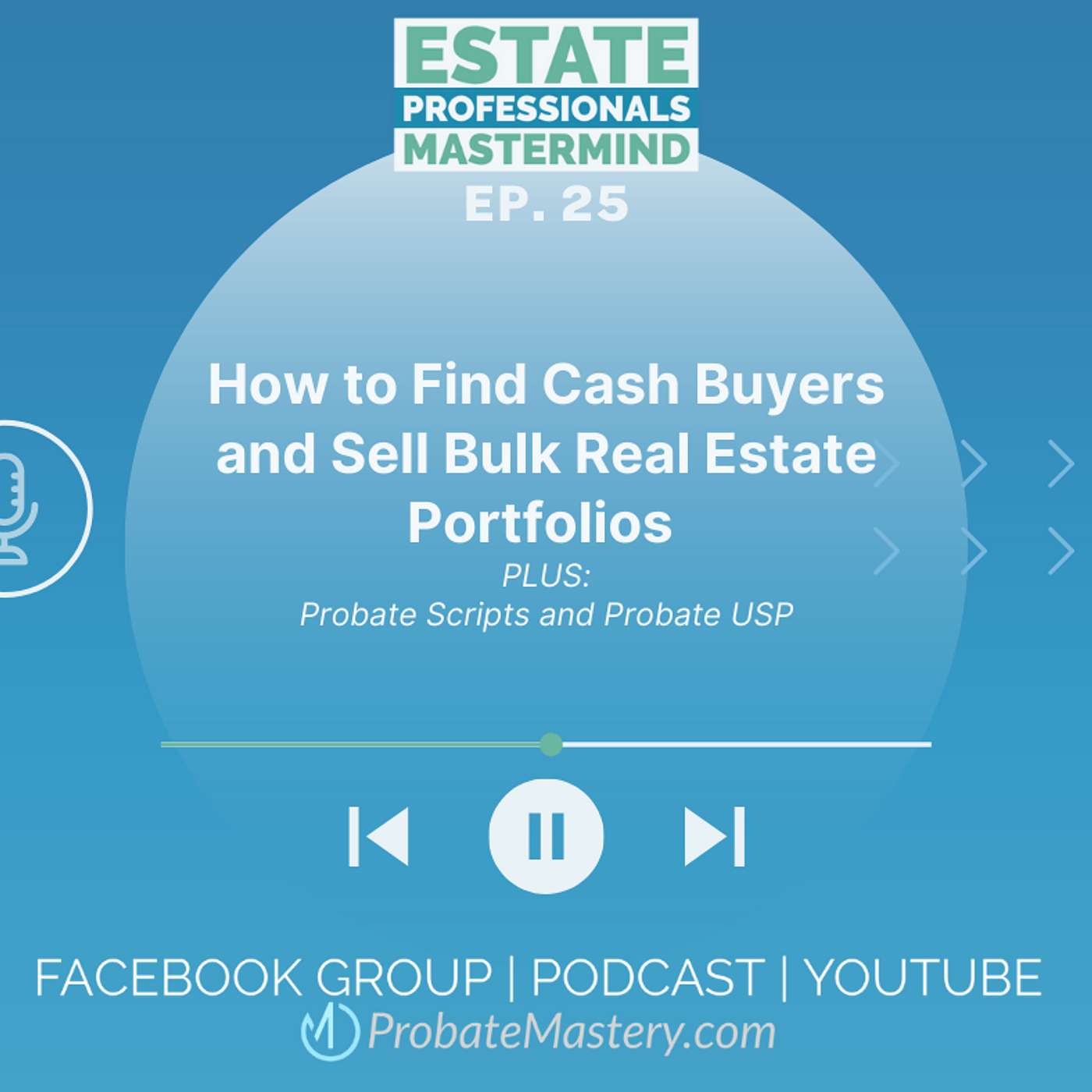
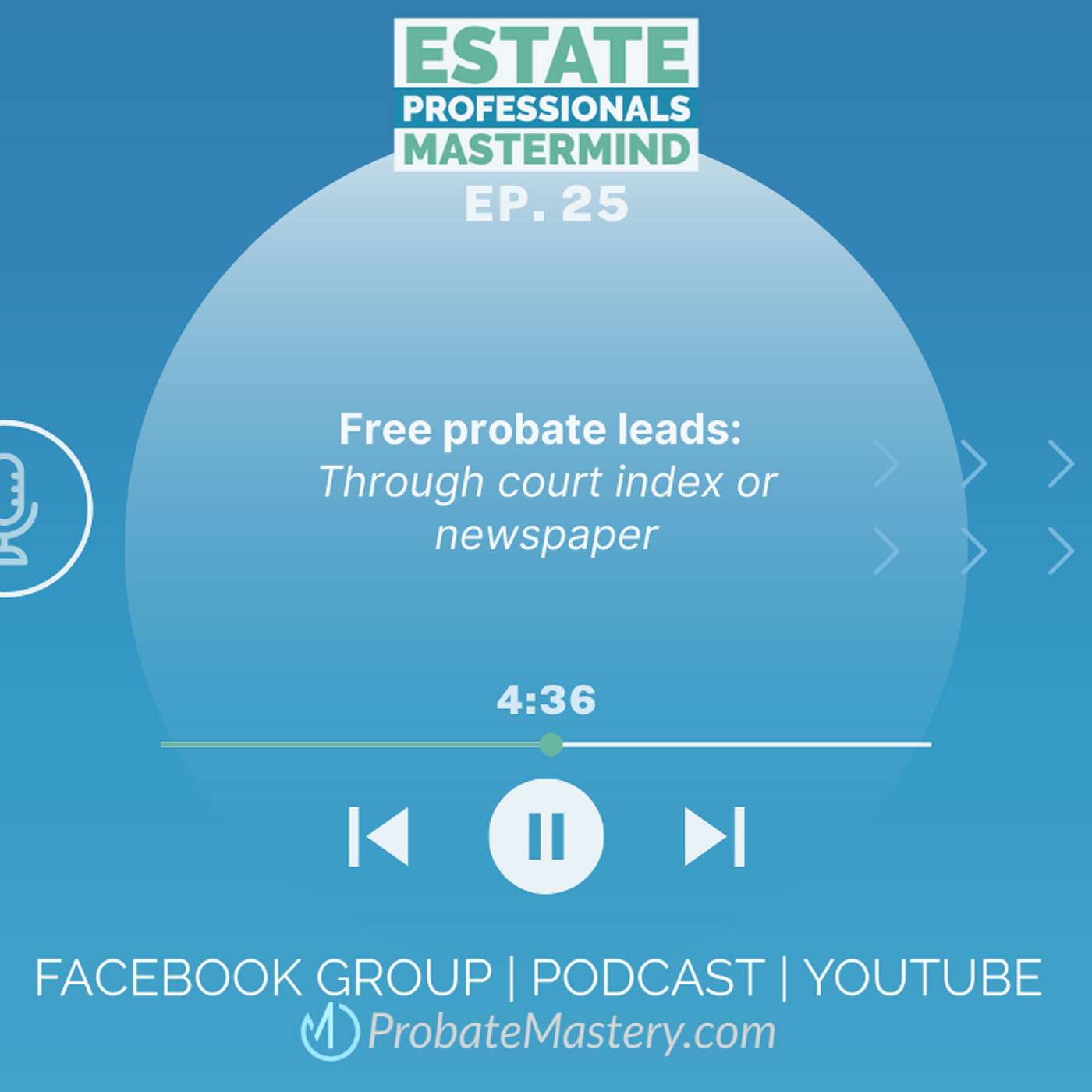
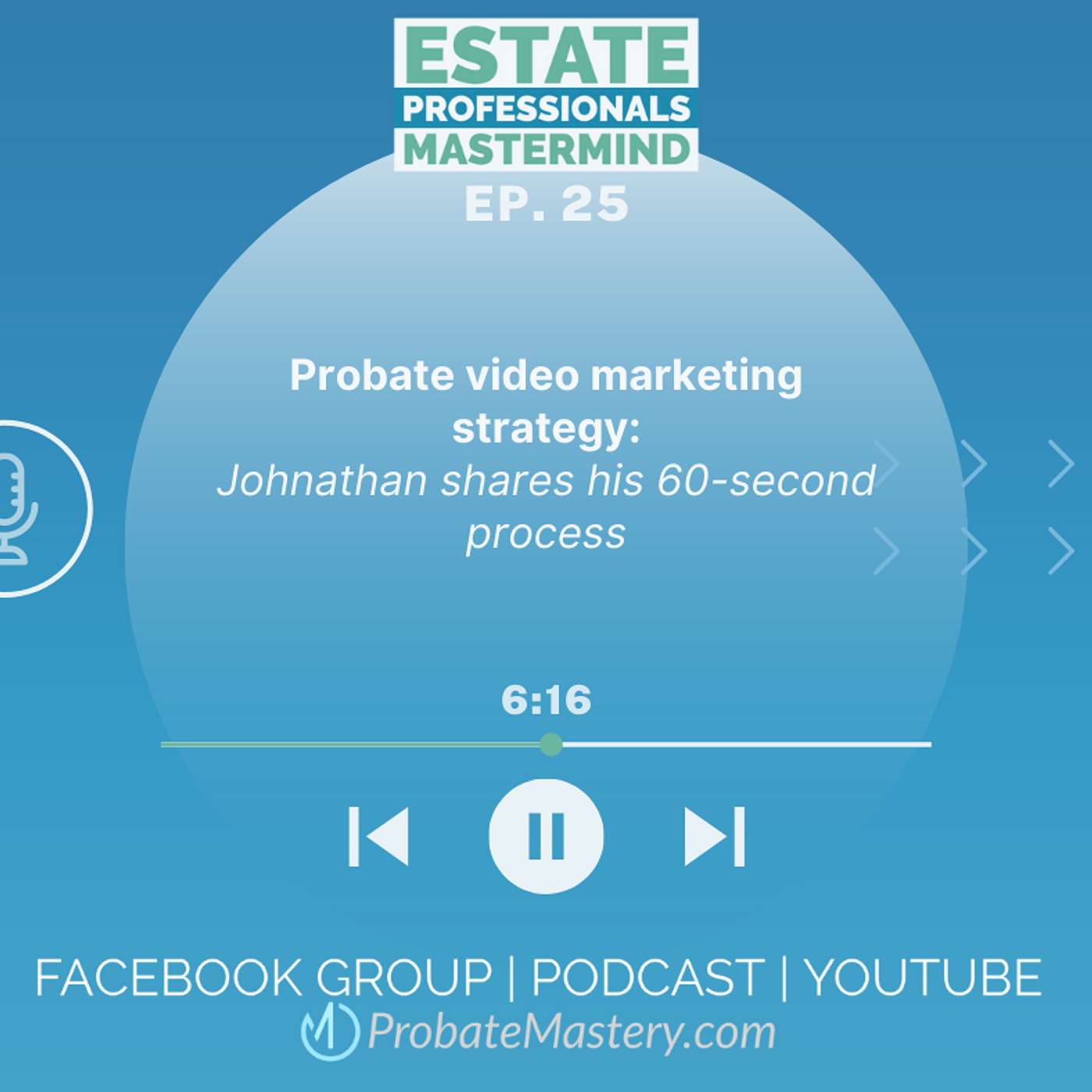
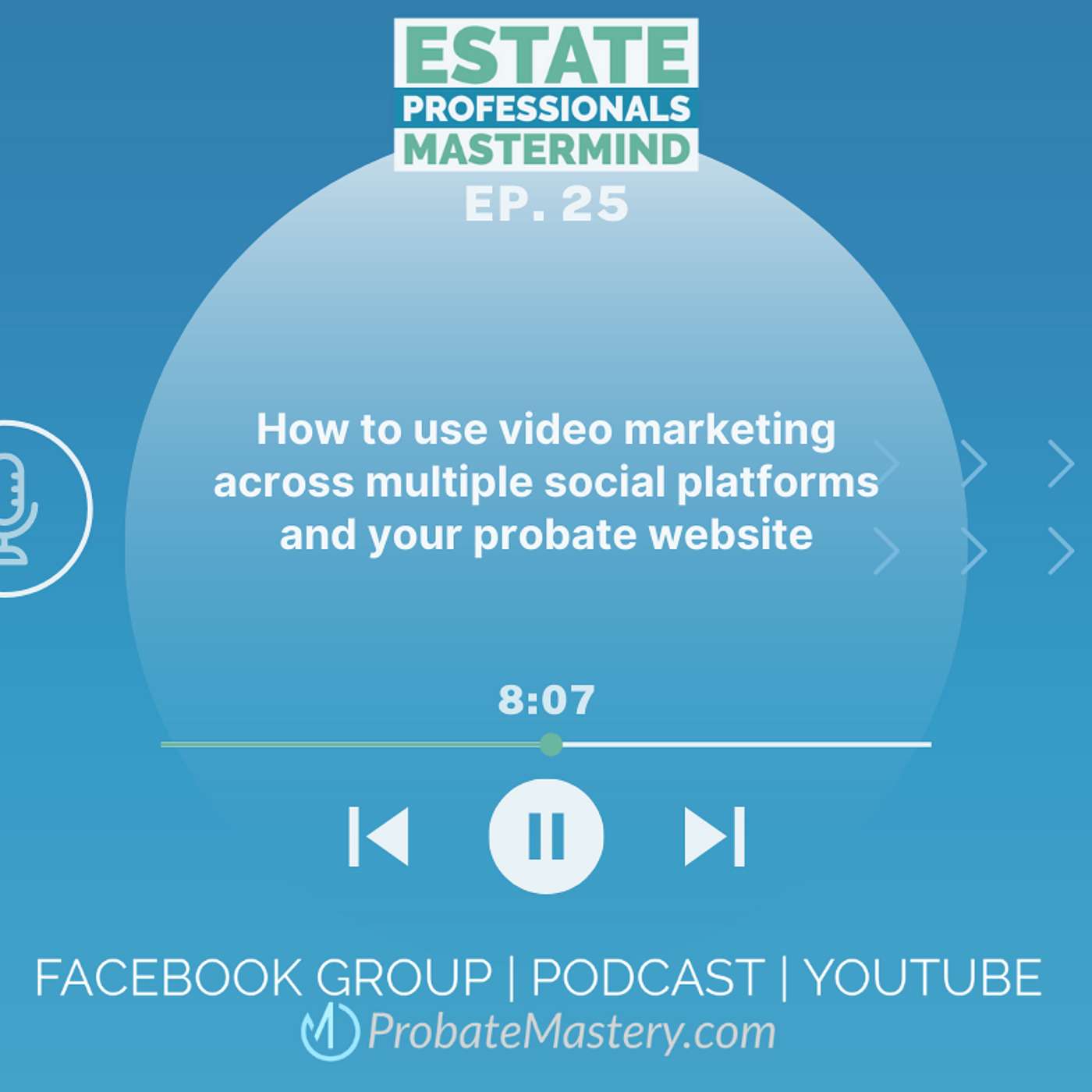
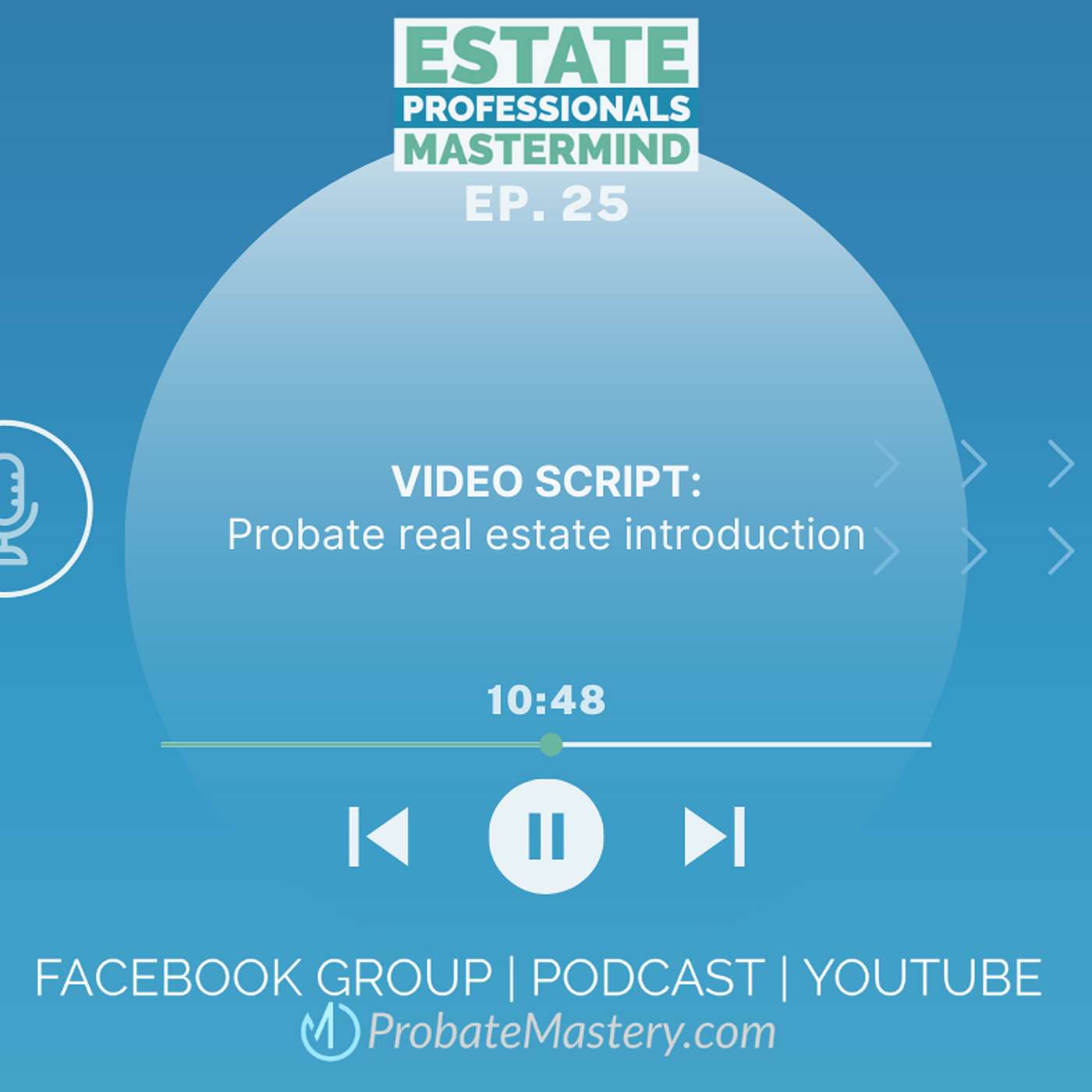
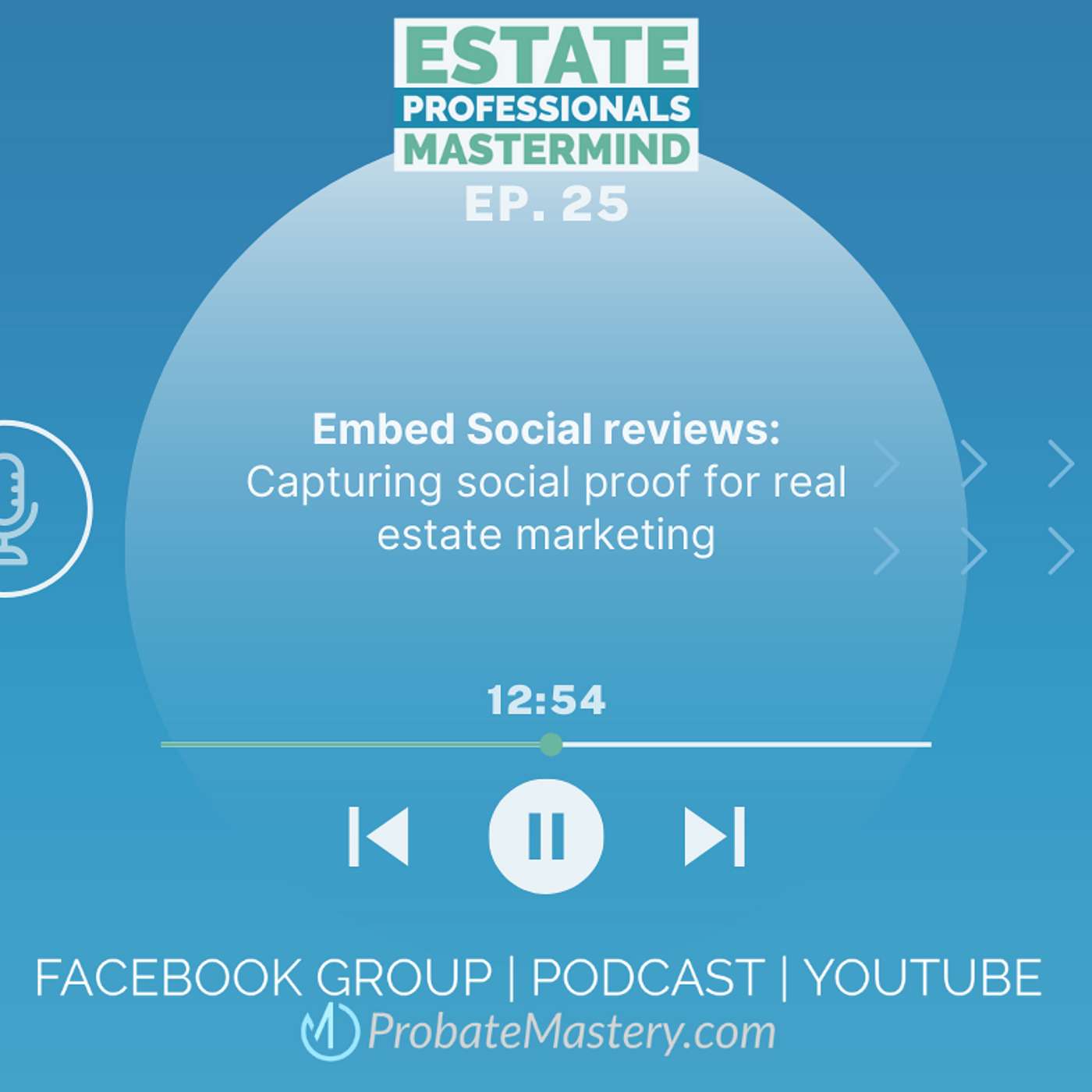
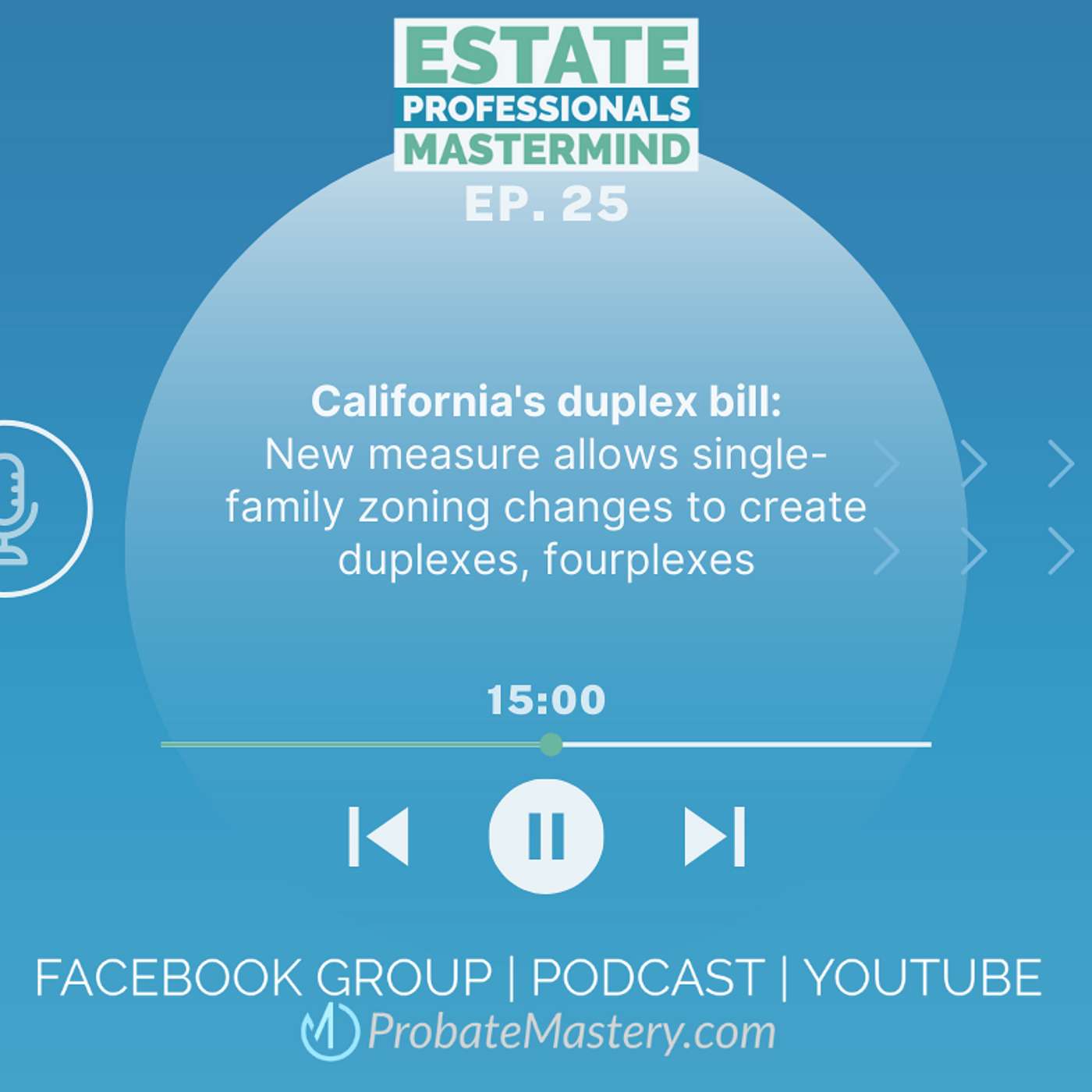
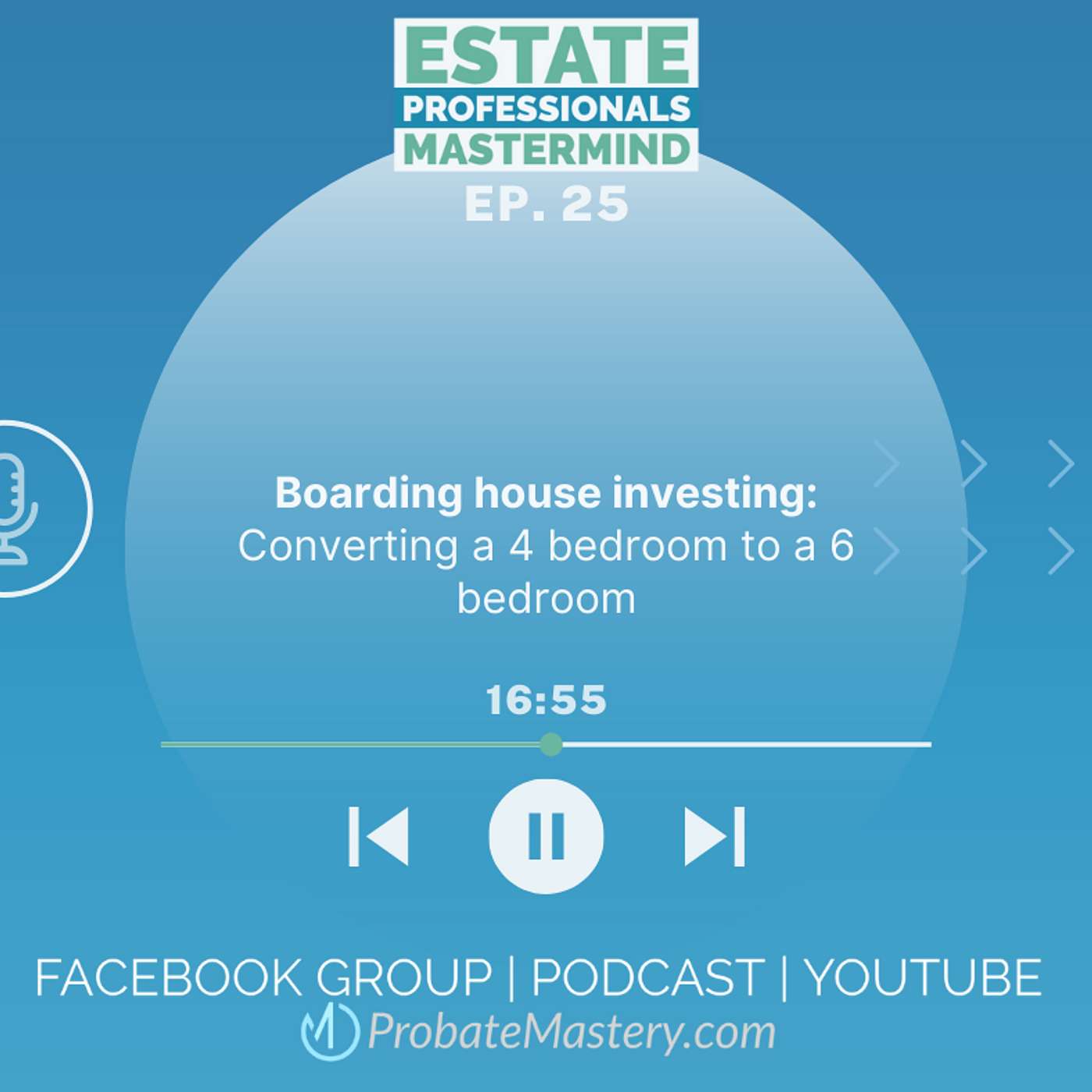
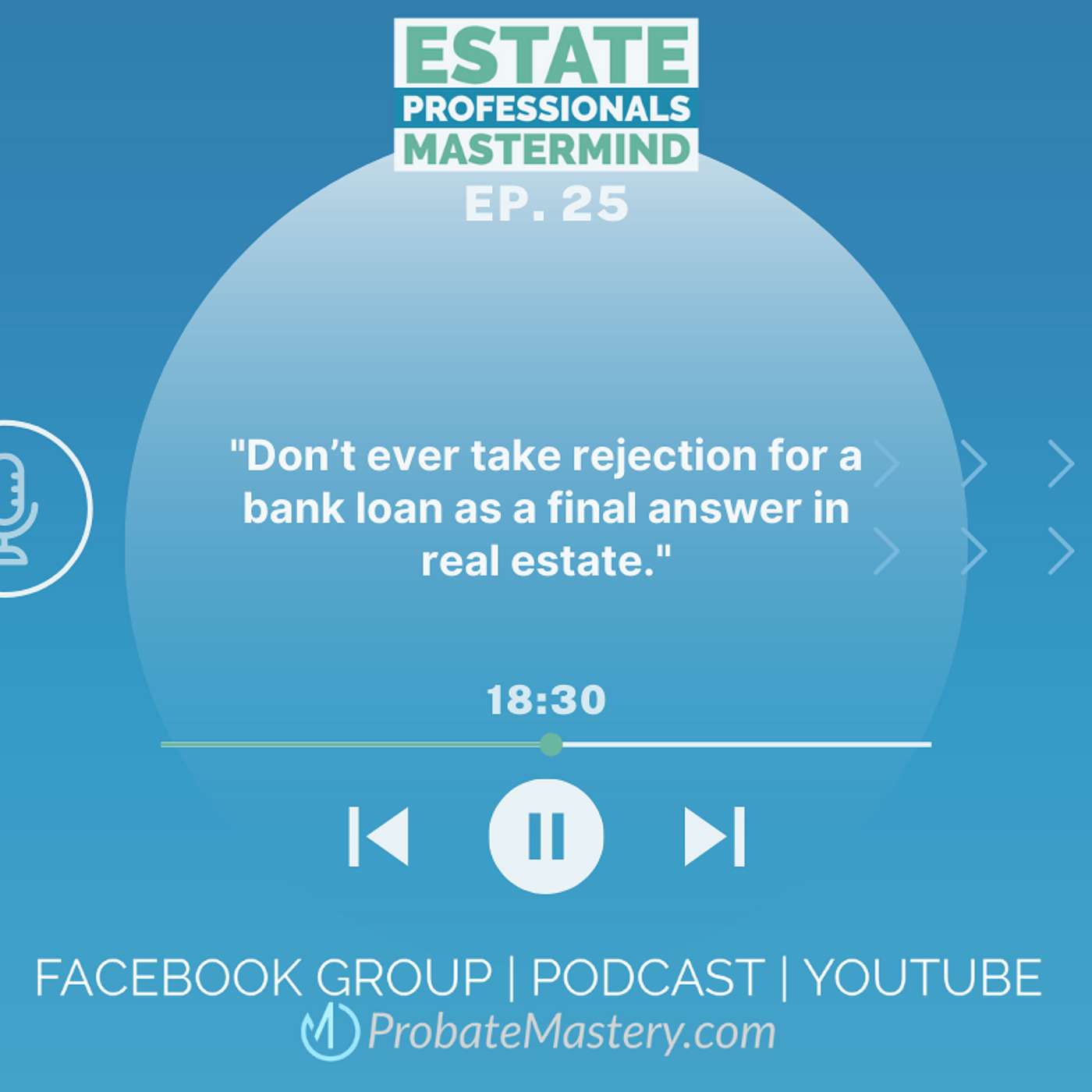
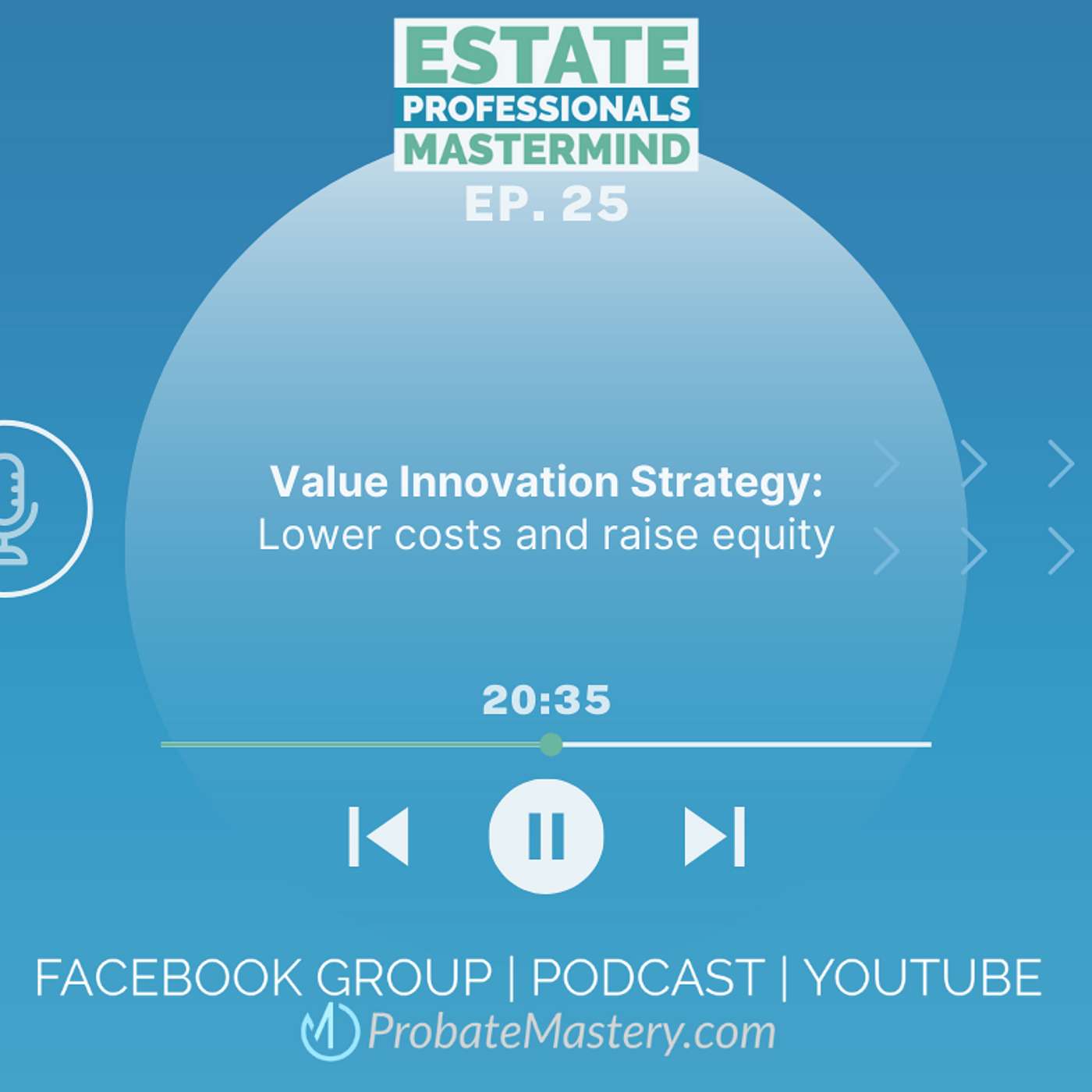
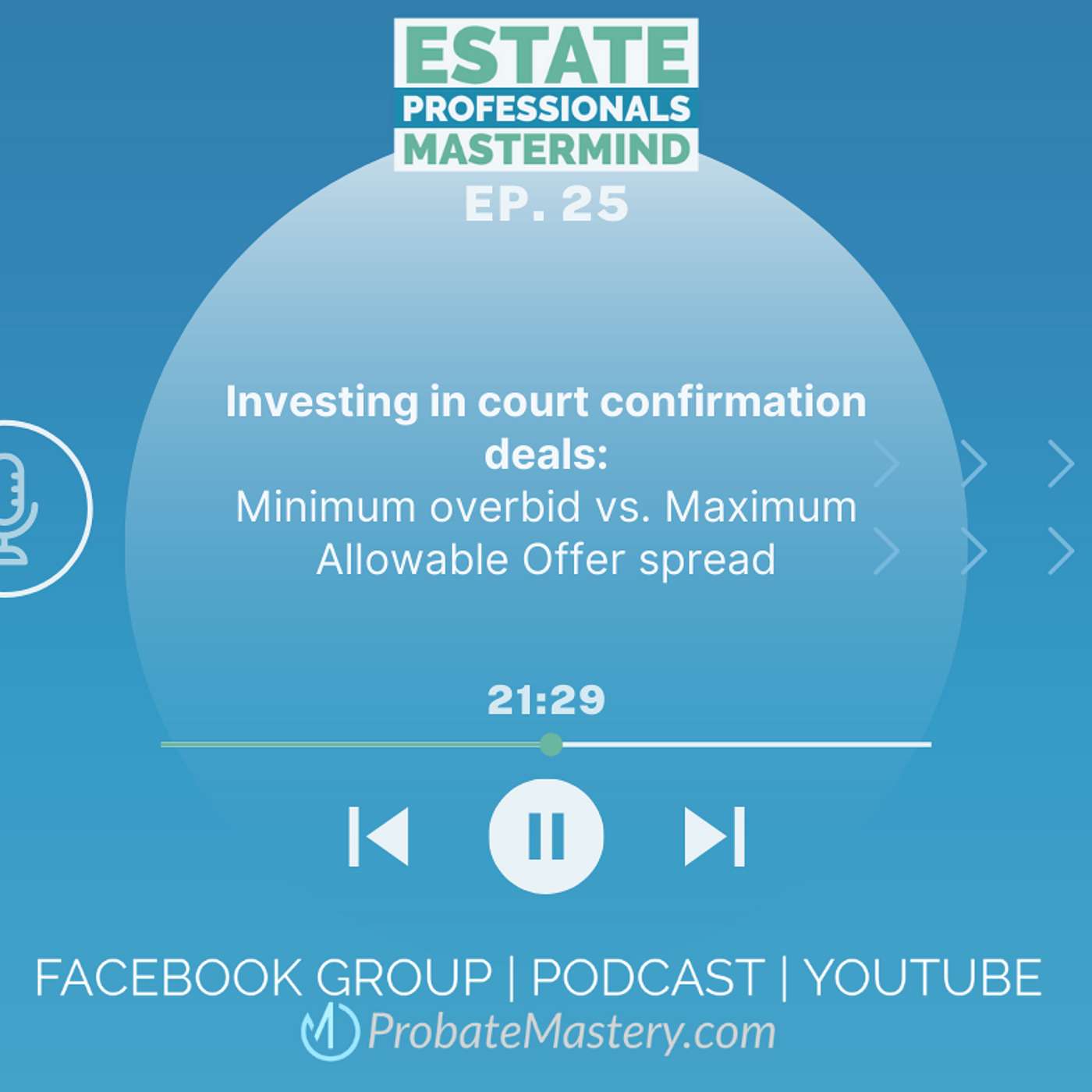
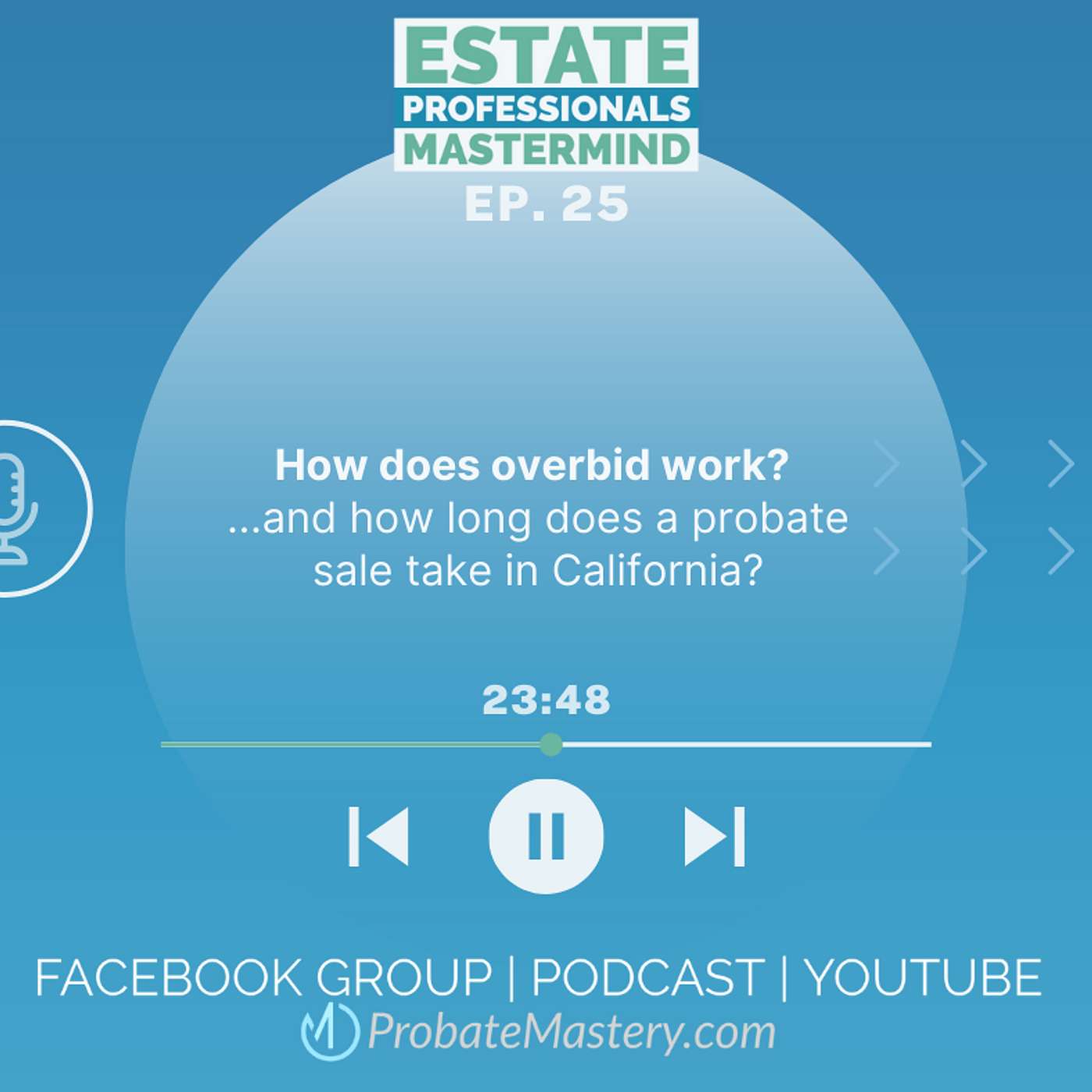
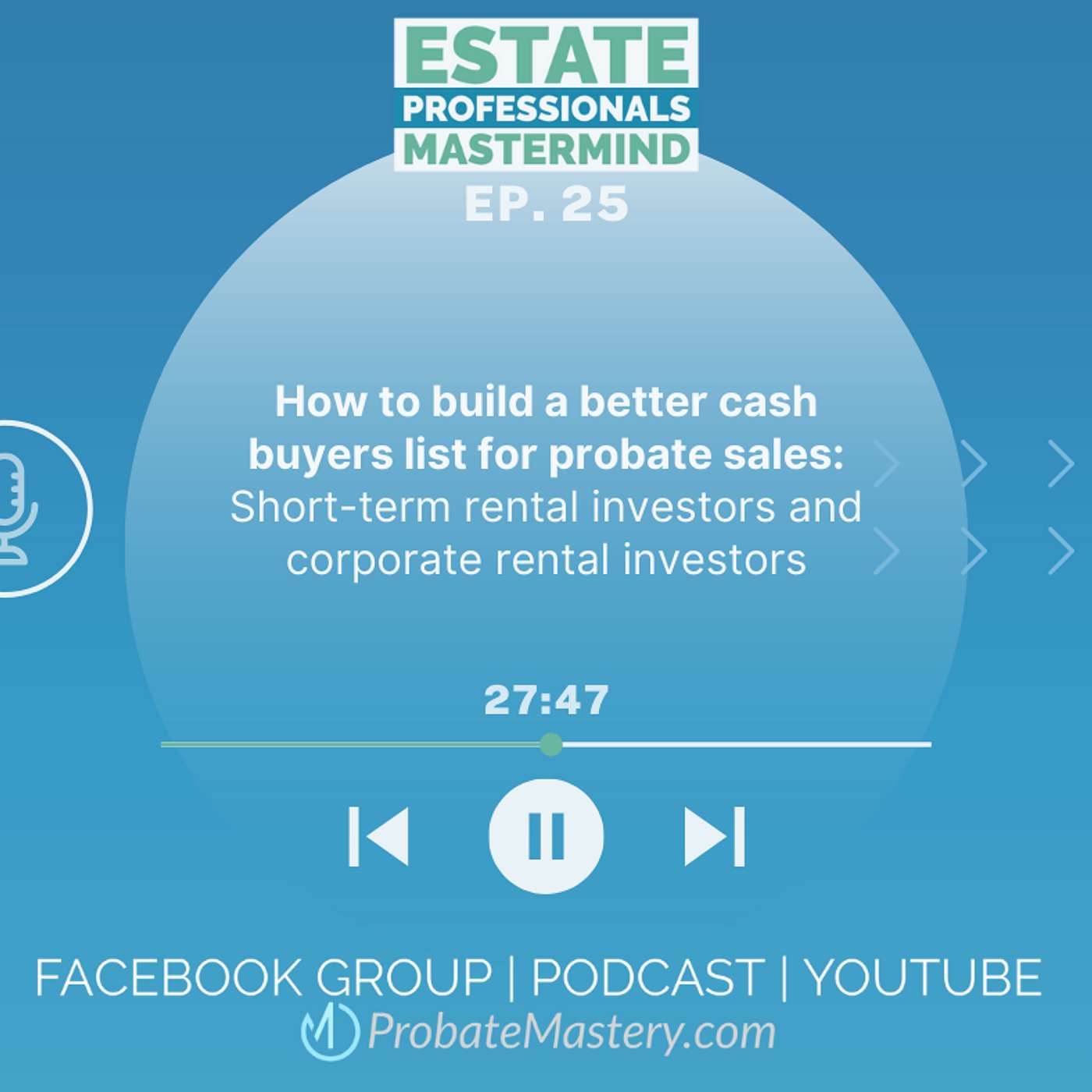
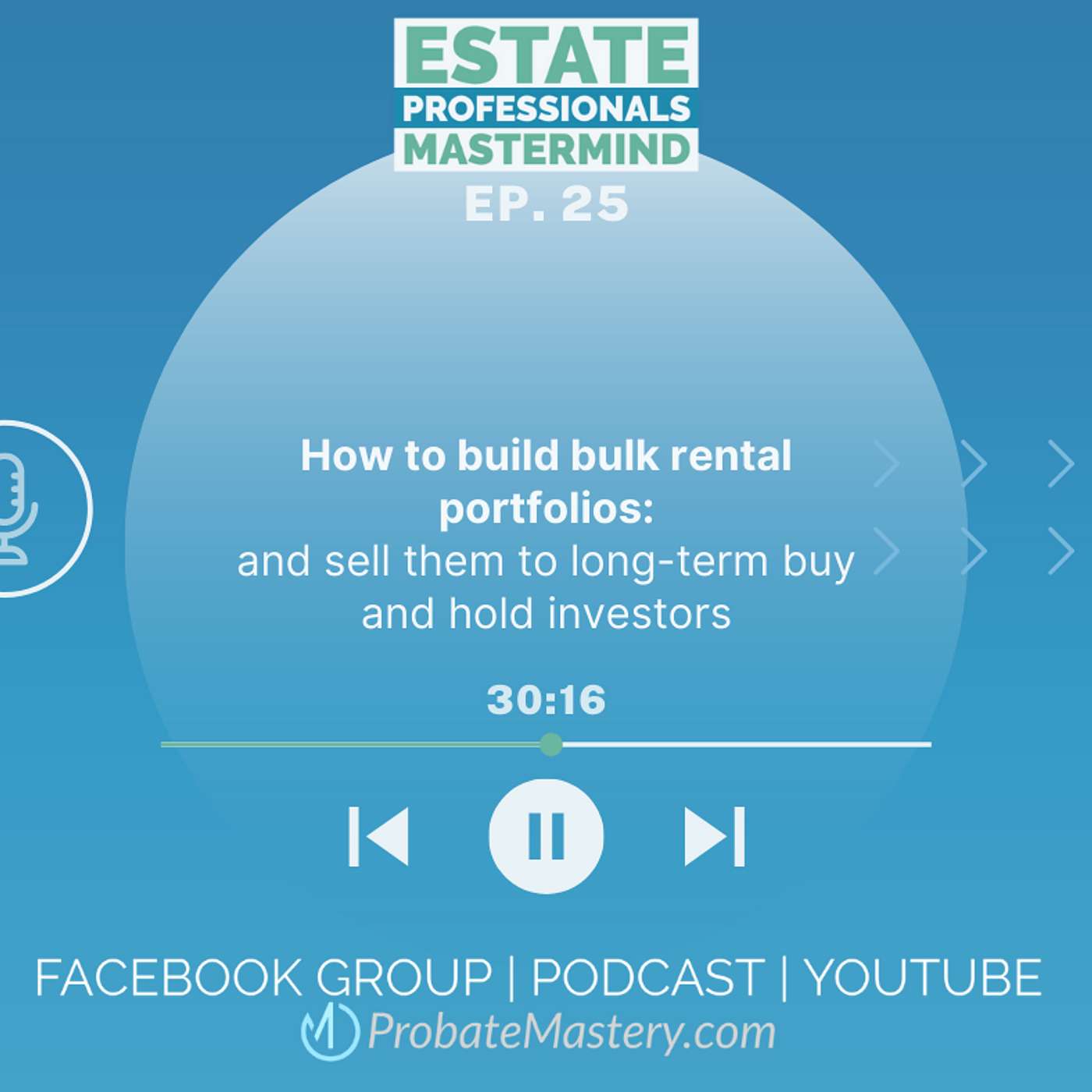

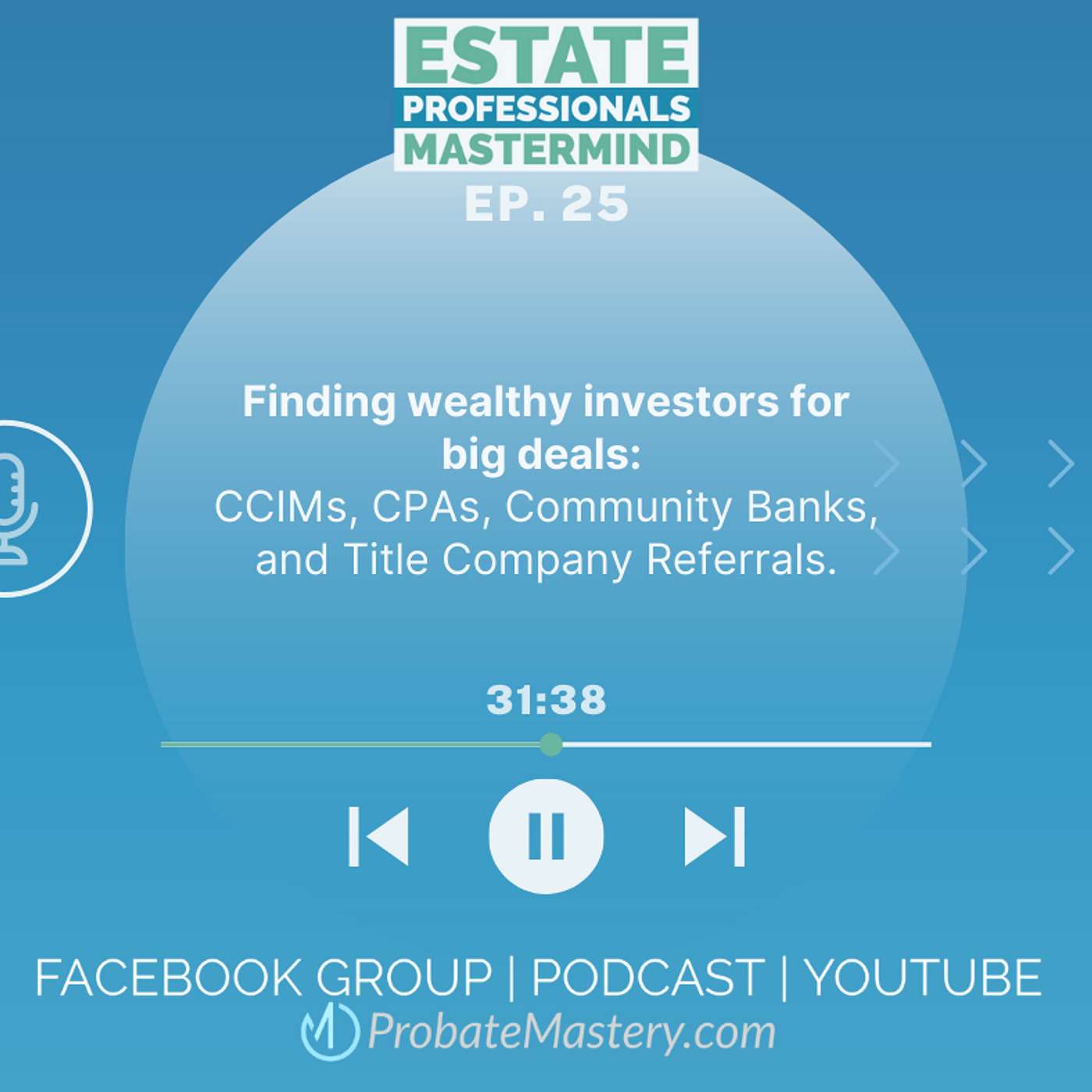
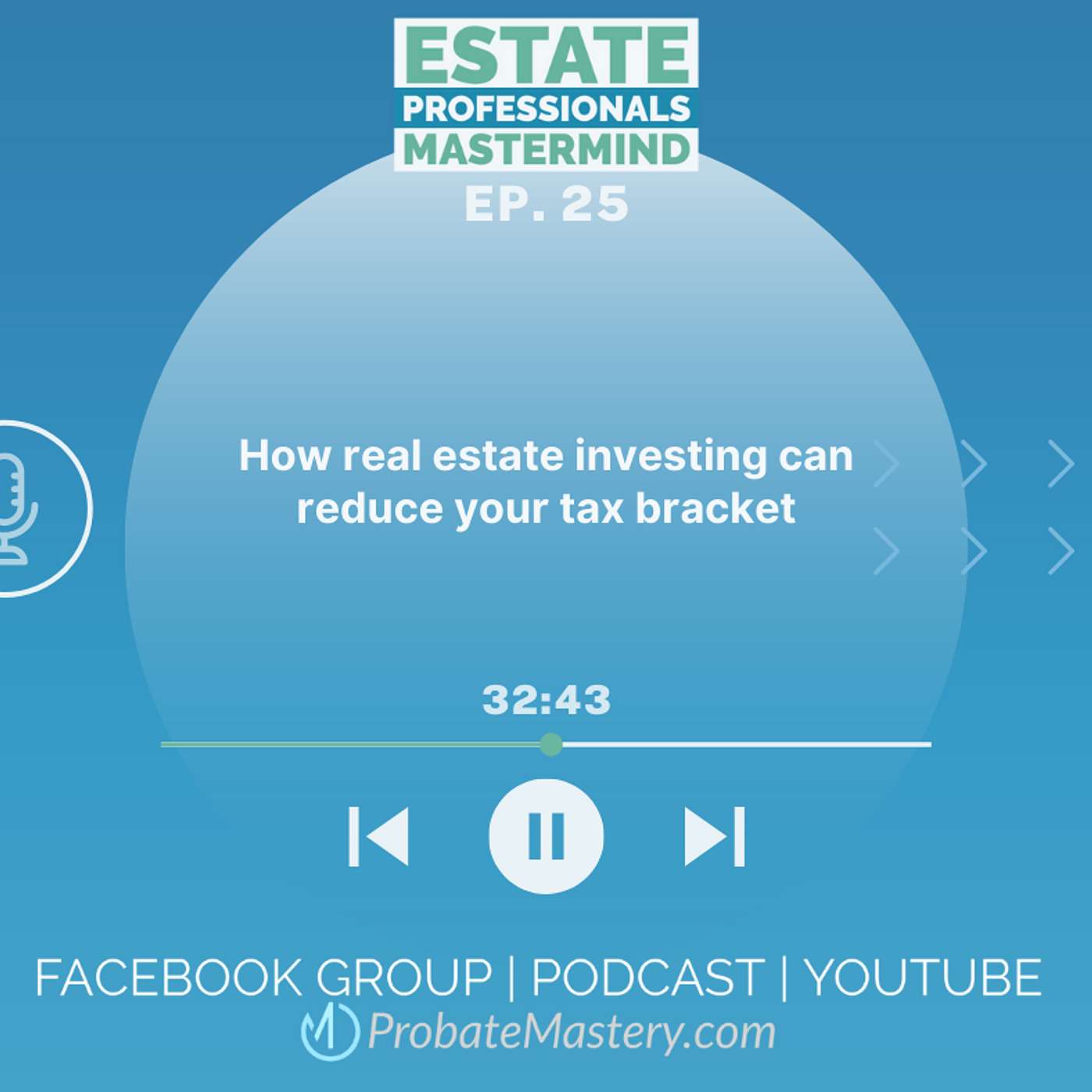
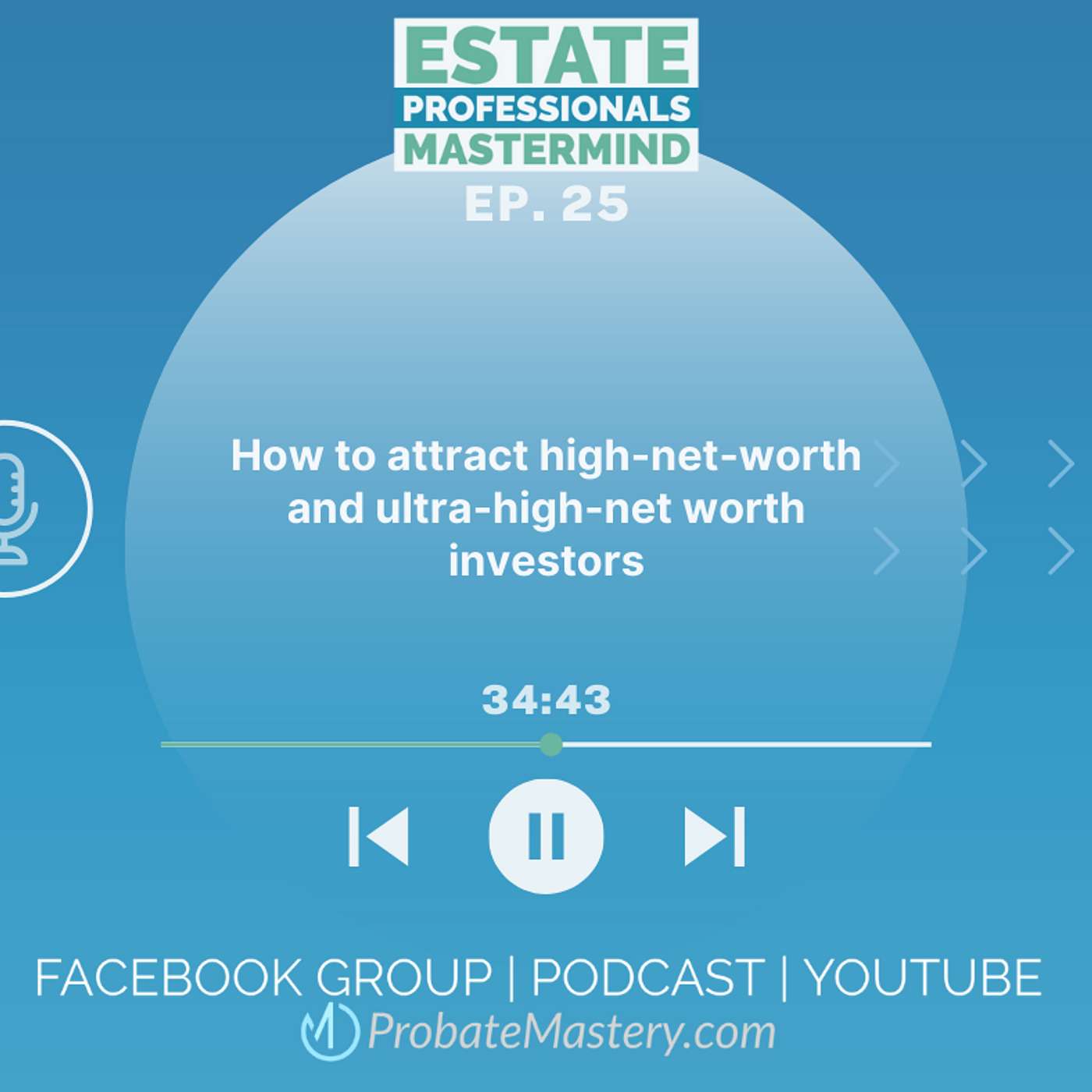
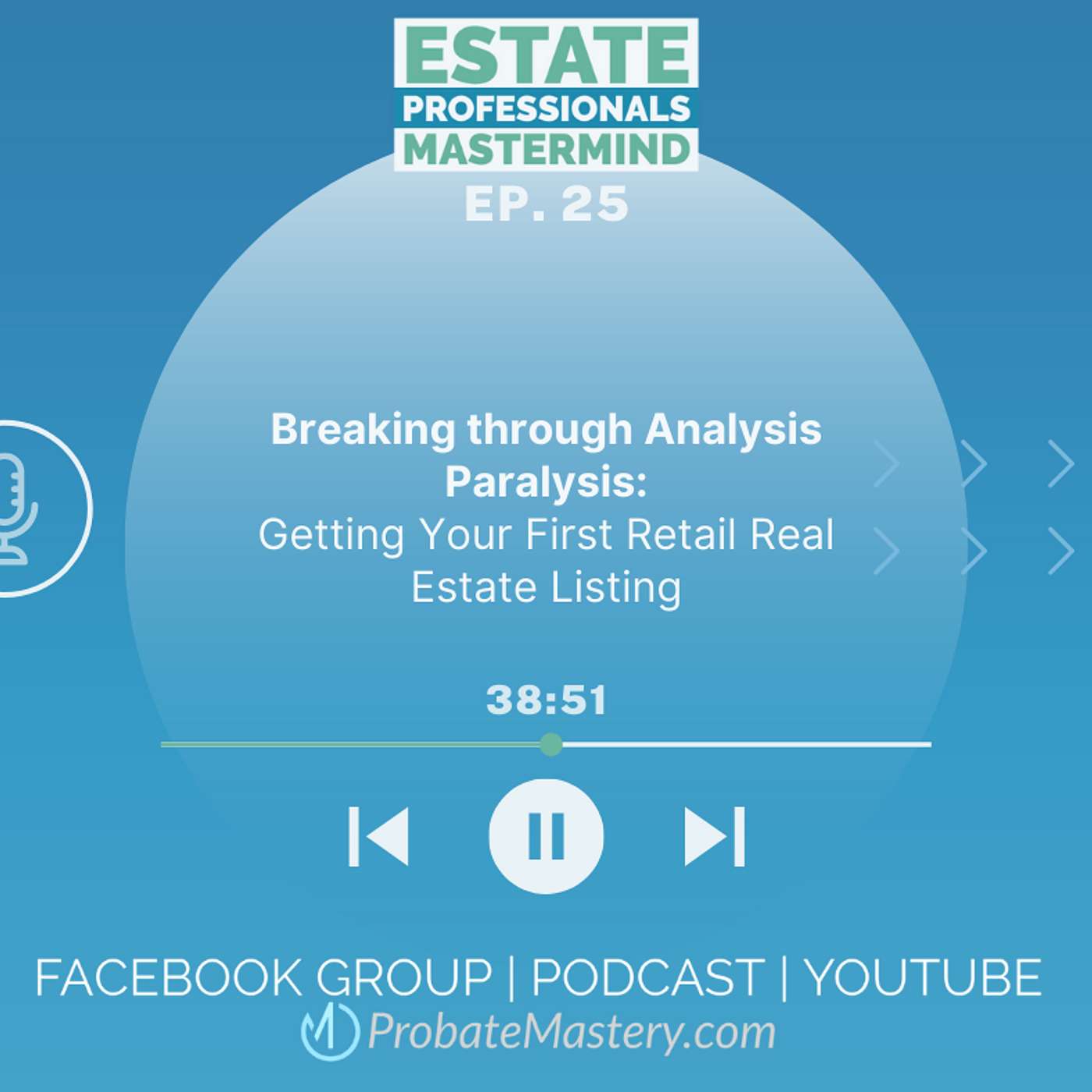
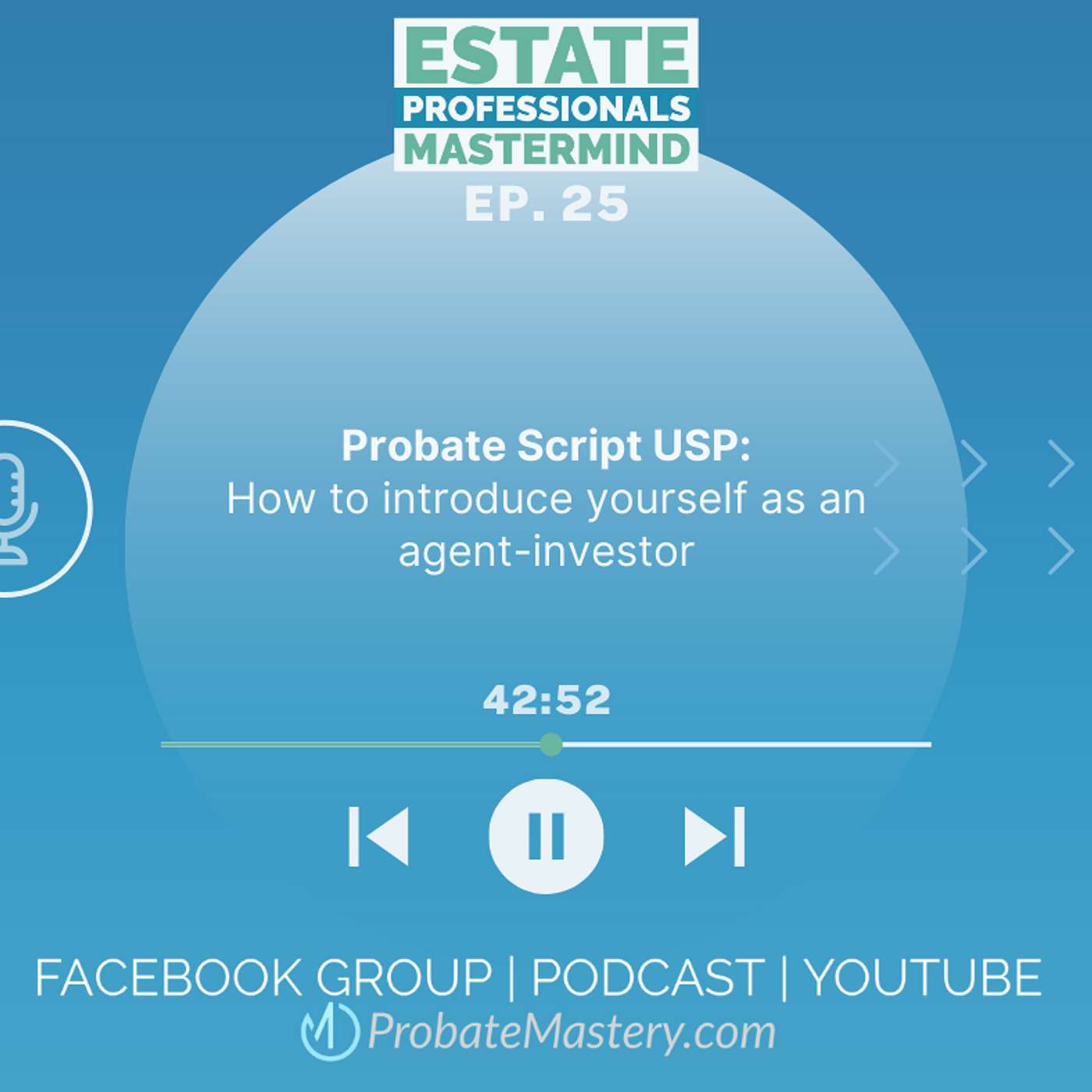
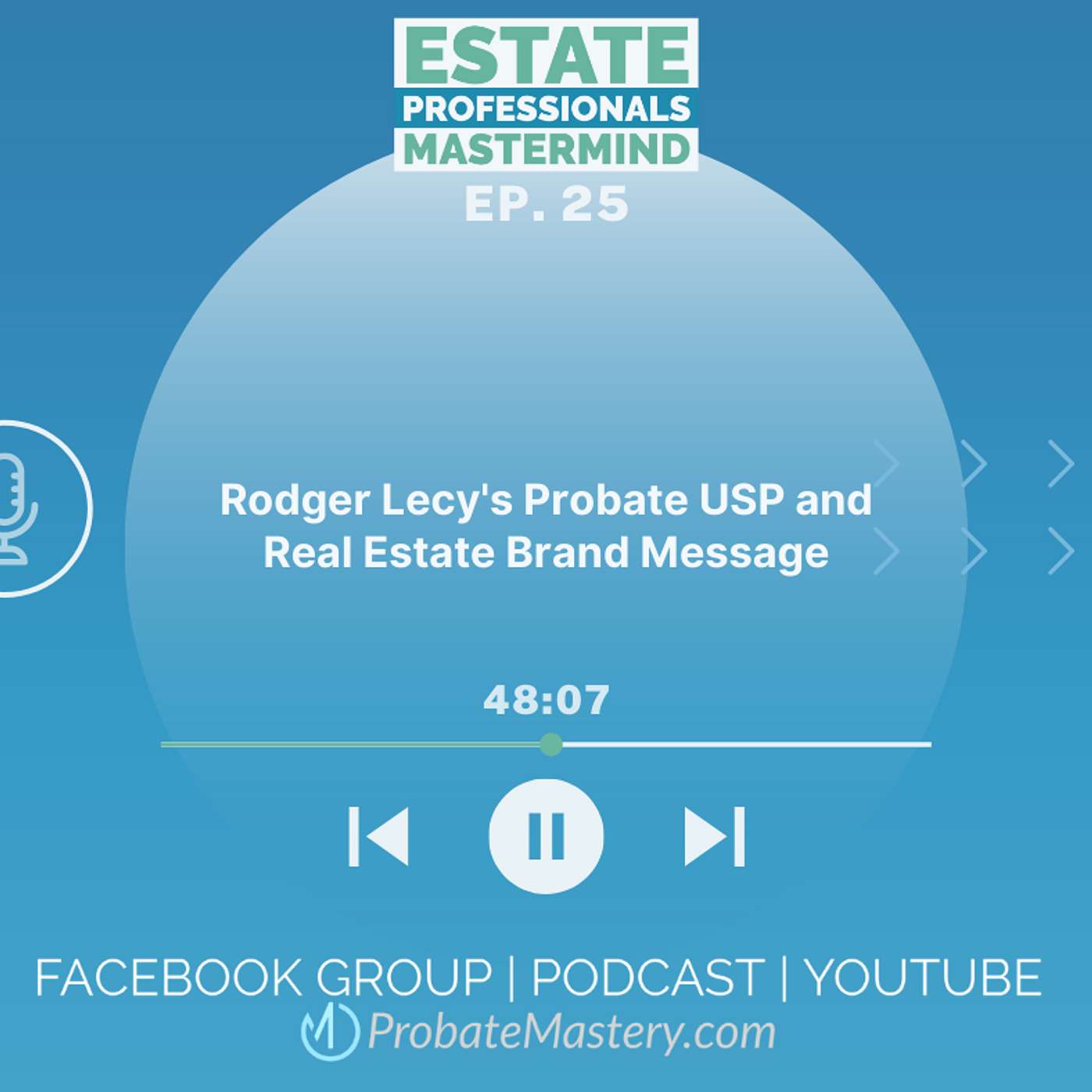
Live Probate Training #25: Probate Lead Companies Compared; How to get probate lead lists for free; video marketing ideas for your probate website; and how to find high-net-worth investors to add to your buyers list for probate property portfolios.
Full show notes and resources: https://probatemastery.com/how-to-find-cash-buyers-and-sell-bulk-real-estate-portfolios-probate-marketing-ideas/
Watch with video on YouTube: https://youtu.be/ATGuBT2pmFU
Chad's Probate Certification Course: https://probatemastery.com
Facebook Group: Estate Professionals Mastermind
Time Stamps (YouTube links):
0:00 Best Probate Lead Companies and How to Get Free Probate Lists
2:36 How to get free probate leads when your courthouse doesn’t publish online? PROBATE ATTORNEY REFERRALS!
4:36 How do you find free probate leads through court index newspaper?
6:16 Probate marketing strategy: Johnathan shares his video process
10:48 Probate real estate introduction video SCRIPT
12:54 Social proof for real estate marketing: Embed Social reviews
15:00 California's duplex bill: New measure allows single-family zoning changes to create duplexes, fourplexes
16:55 Boarding house investing: Converting a 4 bedroom to a 6 bedroom.
18:30 Don’t ever take rejection for a bank loan as a final answer in real estate
20:35 Value Innovation Strategy in real estate: lower costs and raise equity
21:29 Investing in court confirmation deals: Minimum overbid vs. Maximum Allowable Offer spread
23:48 How does overbid work? And how long does a probate sale take in California?
27:47 How to build a better buyers list for probate sales: Short-term rental investors and corporate rental investors
30:16 How to build bulk rental portfolios to sell to long-term buy and hold investors
32:43 How real estate investing can reduce your tax bracket
38:51 Breaking through Analysis Paralysis and Getting Your First Real Estate Listing
42:52 Probate Script USP: How to introduce yourself as an agent-investor
Learn more at www.probatemastery.com
Live Probate Training #25: Probate Lead Companies Compared; How to get probate lead lists for free; video marketing ideas for your probate website; and how to find high-net-worth investors to add to your buyers list for probate property portfolios.
Full show notes and resources: https://probatemastery.com/how-to-find-cash-buyers-and-sell-bulk-real-estate-portfolios-probate-marketing-ideas/
Watch with video on YouTube: https://youtu.be/ATGuBT2pmFU
Chad's Probate Certification Course: https://probatemastery.com
Facebook Group: Estate Professionals Mastermind
Time Stamps (YouTube links):
0:00 Best Probate Lead Companies and How to Get Free Probate Lists
2:36 How to get free probate leads when your courthouse doesn’t publish online? PROBATE ATTORNEY REFERRALS!
4:36 How do you find free probate leads through court index newspaper?
6:16 Probate marketing strategy: Johnathan shares his video process
10:48 Probate real estate introduction video SCRIPT
12:54 Social proof for real estate marketing: Embed Social reviews
15:00 California's duplex bill: New measure allows single-family zoning changes to create duplexes, fourplexes
16:55 Boarding house investing: Converting a 4 bedroom to a 6 bedroom.
18:30 Don’t ever take rejection for a bank loan as a final answer in real estate
20:35 Value Innovation Strategy in real estate: lower costs and raise equity
21:29 Investing in court confirmation deals: Minimum overbid vs. Maximum Allowable Offer spread
23:48 How does overbid work? And how long does a probate sale take in California?
27:47 How to build a better buyers list for probate sales: Short-term rental investors and corporate rental investors
30:16 How to build bulk rental portfolios to sell to long-term buy and hold investors
32:43 How real estate investing can reduce your tax bracket
38:51 Breaking through Analysis Paralysis and Getting Your First Real Estate Listing
42:52 Probate Script USP: How to introduce yourself as an agent-investor
Learn more at www.probatemastery.com
Welcome everybody to the weekly probate mastery group coaching call for anyone that might be new here. These calls are recorded and archived. One of the questions that came through this week was, you know, how do I get these on my phone? And if you're not aware of it, if you go to ProbateMastery.com/PODCAST, I will, I'll go ahead and step out there and say, Katt has built one of the best damn podcast pages in the industry. I've always been a big fan of Amy Porterfield's work. And I think our branding and our, the way we present content is top-notch. So she works very hard to make sure these calls are accessible to all you guys. So if you want to have them on the go between appointments, when you're commuting, be sure to just from your favorite podcast platform, iTunes, Spotify, and everywhere you can subscribe. So these calls will actually follow you between appointments. As far as the theme this week, something that I saw come up a couple of times was people asking questions about leads. And one was a Canadian, who wanted to take this course and wants to be in this niche, but she's not sure how to get leads cause there aren't any lead providers. And most of you guys, I would assume, probably have automated your probate lead gathering, but it's not technically necessary. I know there are people on this call who are getting their own leads whether that's through a researcher or through some other third party. I obviously was one of the founders of all the leads I've sold my shares in that company. So not here to have a commercial for any one lead company. More so to anyone who is a certified probate expert who's taken probate mastery, you're stuck in the mess of gathering your own leads or you're not to that point yet you took your course and you're trying to figure it out. If you are stuck with leads, the lead you have aren't producing, or you don't have a way to get leads or can't afford leads. There are obviously lead companies out there and Katt will drop the link in the chat right now and then the show notes. We have a post that kind of assesses the top five probate lead companies in the industry. And I think objectively, I mean, All The Leads, is one of those, because we do believe they have most accurate data. It's not the most timely, but it is wrapped in a system but it's just a fair analysis of the five top places you can pay for probate leads. Since I started in 2012, I have yet to meet a single person where I would say, you know, you should go to the courthouse to gather your own data. If you have online data access, sometimes you can do that and you can use a virtual assistant to do that. But otherwise you should be outsourcing this to someone, whether it's a company or whether it's an assistant that you pay, Your time is probably not best spent as a court researcher. Unless you want to be in that average income level of the average realtor how do you get leads if you don't have access, if you live in Canada, if you can't afford them, if a lead provider is locked out in your area, building a referral network is the quickest path to a closed deal, period. Leads have a cash conversion cycle of 60 to 90 days. A good qualified referral can have a cash conversion cycle in days. But inside of 30 days and John Fraker, I'm glad to see you here. Connecting with people like John Fraker, attorneys that are running at the top of their class and service, like really empathetically care for their customers. They're looking for the same in their vendor partnerships. So if you can find those attorneys who are very knowledgeable, very professional, have a high standard of service and connect with them. You can get deals in weeks. You can have closings, and then just make a commitment to reinvest that into, you know, your leads. But if you're in Canada, if you're in one of those situations, you know, probate mastery will teach you and this community more importantly than the course, and the course, we might talk about it, you know, that's an hour combined, but the more important part is being part of this community. So sharing and ideas, raising your hand and asking for help, telling people what you're trying, whether it was a success or a failure, sharing what techniques you have And that's something that mainly comes from the people joining the community are our estate professional mastermind before they actually realize what mastery is and jump into the niche. So just a reminder, like leads don't have to be a stumbling point. But other conversations we have here about super competitive markets, investors beating you to the punch. Like if you're in any of those situations, focus on building that referral network first, and then you can always go back though what's leads. But I've watched people, I've coached people and watch them build businesses in markets with two or three leads a month and build a better business than they've ever had, like more revenue than they've ever been able to achieve.
John Fraker:One thing that I do in other markets that I'm investing in, almost every major courthouse for a county, larger counties is going to have some kind of court index newspaper where that stuff is published basically daily. So I have a couple of markets that I invest in outside of California. And I mean, these are the gazettes and the stuff that absolutely nobody reads, including most attorneys, unless you have something pending. But it lists every single day, a list of new wills published. Every state has some kind of notification process for when a new probate is filed or whatever, and it will have relevant information on the people who filed it. You're probably going to have to do or delegate to a Virtual Assitant, skip tracing of the right people, but at least you're going to be a fairly inexpensive way of getting at least the rough info, if you want to take it from there. What we found when, when I tracked every single customer experience metric in all the leads,, what I've found
is:folks who came through probate mastery first and then got access to leads, whether they gathered them, like are, you know, that that became subscribers. Their tenure was four times longer than people who didn't have the training. So with, with the course, you know, knowing what to say to them, it made their leads far more valuable.
Chad Corbett:So if you've already taken this course and you haven't gotten the leads in place, let's set that as a goal, like a personal goal. Like let's get some leads in your hands, whether that's through building a referral network, finding a way to gather them at the courthouse yourself, or, or using one of these third-party companies to deliver them to your inbox or CRM. There's lots of ways to get that done. And also, you know, if you're really in a bind, we've had several investor realtor teams where they'll actually partner up split the leads and marketing costs, and use the methodology that, you know, that we teach. All right. Jonathan Hawkins. I'm curious to hear an update from you, sir. How are you doing? I'm well, how about you? I am doing fantastic. So tell us about your progress.
Johnathan:So I actually did something that Katt and David had challenged me to do. I did a video in front of a, in front of the clerk's office. How many takes? Three. NICE! Three takes, one take the bus came and sat right in front of me.[Laughter] Then you hear the engine going. I was just like, and it had another dude's face on it, didn't it? Like "do you need to sell your house?" It was just the loud engine and couple of guys. I'm doing so many, double-duty here. But, I'm getting some traction from that a little bit that I'm been getting a lot of notoriety. I got people calling me a different in different states, wanting me to sell their property, ask me about probate. So let's talk about how you produced it.
Chad Corbett:Cause we, we discussed this idea often and I challenge people all the time, get into video. So how much post production did you do? How much editing? Where are you hosting it? How are you using it? Like where'd you get all that traction so quickly with it? Just simple recording, editing on my own I movie and saved that to my iPhone, uploaded to Facebook, made it public.
Johnathan:And also to Tik Tok and Instagram.
Chad Corbett:And the people who reached out to you out of state, the unexpected ones, which platform did they come from? Do you know? That's pretty amazing. So you got to take notes. I mean, we, we tend to focus our inbound strategies, largely around Facebook and YouTube, because that's the most obvious video places. But the tech world is quickly realizing the power of video and almost all platforms, you know, allow you to host that now. So How long was the video of Johnathan?
Johnathan:60 seconds. That's perfect. It was right under a minute.
Chad Corbett:And for anyone on here who has been issued a challenge to go make a video in front of your courthouse, the idea is to create a video that's disruptive in a good way because they have an emotional connection with that scene, with that backdrop, because they've been there and likely in the last 60 days, they have actually seen that. You know, you've seen the videos where people have flashcards or they're waving their hands and don't this bogus crap to get your attention. That's just not good marketing, right? This is something that subconsciously we can get them to identify with the scene and be like, whoa, I was just there. Who's this guy. And then you speak to them as a local voice as the local expert and explain to them why you're at the courthouse every third day and what it is you're trying to offer to the community. I rarely use Tik TOK. So I'm really happy that you did that. I'm getting hashtag old I guess. Katt keeps trying, but there's just too many. That's pretty awesome. You've got some traction on, uh, on that. I'd be curious to see longer term if that holds up, like if it gets buried, that's the one thing that YouTube is better at it. Old videos that have value and continuing to rank them up where the other platforms like Instagram and tick talk, at least in my perception, just bury everything. It just gets lost in the constant barrage. Right. So I do want to see you get it on YouTube because that's,
Johnathan:I'll put on today. I'll put it on YouTube today. I'll probably go back and put my number at the end of it and repost it, different other places, maybe groups, but definitely back on, or maybe pin it somewhere to my page, my personal page. So it will be still, still be there for awhile. Try to keep it a little fresh.
Chad Corbett:let's talk about how you're using it throughout your marketing. Once you get it on YouTube, embedding that into a page on your site where you can drop a link or you can buy a domain. So you could buy the domain like Dallas probate. Dot com and then just go into wherever your host and just redirect that to the page on your website. The reason buying that domain with a redirect is easy is you can put that on a postcard. So, if it sounds too good to be true, or if you want to know what help your family can get, go to Dallas probate, pro.com, and then it's really easy to remember, and they'll be able to go direct to that page on your website. And then there below the video. Your call to action should be My phone number is at the top of the page feel free to stop the video and call me at any time. Otherwise pick a time that's convenient for you, and I will reach out to your family. And if you use the link below, that'll set up a video call, if you would prefer to meet over video. Once you land them on that page, give them a couple of ways to reach you. They can call now, or they can have you call at a time they choose. that's a really good way to use these,
Johnathan:but do you use the appropriate website that I have? Yeah. I mean, I would just add a page put it on your about page, it sounds like, is it a generic, like if you don't mind share the, kind of the basic script, like, what did you say in 60 seconds. Basically, it was like, guys up here. We come here every month and we pull probate, because people were going through probate. They don't know what to do. So that's why we're here. We have a team of professionals that are here to serve people. I help them get through the probate process. I mean, a couple things, you know, and so guys are going to be the questions about that whatsoever. I'm here for you and just hit me up, inbox me or whatever I'm here. And that was it real quick. It was part of USP I rolled with it like that, I just grabbed some things from the USP, put it in there, use my personality, use the backdrop and made it about 60 seconds in and out.
Chad Corbett:So Do you have an about page? Yes, I do. Yes. Okay. So if it fits there, go ahead and put it on the existing about page. Otherwise you can make a sub page to that child page that says, how we help. So this is about Jonathan. Big Jay Hawk as you put it. And like, this is about me. This is about my service and you, you know, how it works would be a name for that page, so you would have the video, you would have the call to action that would book them directly into your county. Or your phone number prominently displayed, give them a choice.
And then below that:here are some of the ways we commonly help families and list those services that aren't real estate related first, like show them, we help families understand the probate process and navigate the non-legal aspects of that. We help families get personal property sold. We help get, you know, so, and ... but go down through and give them a sampling of some of the things that they probably wouldn't expect somebody to offer. and you don't have to mention real estate cause they're gonna, they're on your website. They're going to figure that part out. So don't be so eager to say we sell homes for top dollar, faster than anybody else! Like try to step back a little, build that relationship and really show them what you can do for them. So video, phone number, call to action. List of features. And then if you have testimonials and get those in below it, and this is a tool that I have actually fallen in love with guys, if you've got Facebook reviews and reviews in general, a really good tool that I like Trustpilot is one. I ended up choosing Embed Social. And Katt, can you drop a link to everybody in the notes? Embed social will aggregate, multiple sources of reviews. They have some really good widgets that don't hang up your website, plug them right in. So we aggregate reviews from Facebook, our own forms type forms, different places. So you can actually set up multiple channels to be shown in one place on your website. So one might have a Facebook logo. The other may have come from your website. The other might be from a survey form that you filled out, but that's a really good way to. As you build reviews, yourselves page, you get stronger because you just get more and more reviews on that page. So you use a tool like embed social to aggregate those reviews for you,
Katt Wagner:I just want to add with embed social. It also adds depth to your Google search results because it will populate your, your five-star or whatever your rating combination is right within the search results at that page that you embed embed social on ranks in a search result, they'll see five stars under the piece of content, that specific page, that piece of content is really valuable and it stands out visually in the search results page.
Chad Corbett:Yeah, we used it for six or seven months before we figured that out. Great, great tool. It's cheap. I don't know. It's 15 bucks or something like that, but it's worth it for the social proof. So as you get reviews and we can reissue that challenge, if you guys have ever been told you did an incredible job for us, thank you so much. And you didn't get it in writing. You need to go back and get it in writing. And if you can get it in a video it's so powerful with, with social proof and your next deal on your next deal and building attorney relationship. Like when somebody sees these public facing gratitudes, they can't help, but know that the community actually finds value in your service. So, Gary, I'm not sure who was first, but you guys feel free to jump in. Okay. What do you got? Sorry, I keep missing you, man. My neighbor, everyone found that I was home. So they're showing up. So I'll mention to you again last night
Gary Nash:No worries. Hey, first I want to do a shout out to, Hey Tom, how are you? Partner? And, Dave Gwinn sent me a friend request on Facebook. I didn't know who he was. So I was like, I make steam. So send me another friend request. Yeah, it should actually actually connect Dave Gwinn is in one of those markets where he could really benefit from your skillset.
Chad Corbett:Dave that's the guy that knows how to take an investment deal when everyone else says it's overpriced and you can't make any money. He can unlock profit and a deal through design changes, contractor relationships, being a good negotiator. And if that doesn't work, he's a world champion, arm wrestler. So go to his with the guy's until he gets the price he wants. Perfect.
Gary Nash:Hey also wanted to, I wanted to tell you, everybody hear about California, anybody out there in California?
Nina:Well, there's all kinds of things.
Will:Wildfires, earthquakes!
Gary Nash:They up-zoned single family houses, any single family house now in California can be converted up to a fourplex at $2,000 a month for a two bedroom, California gold again, pretty huge. I mean, that, it's interesting like that, that worked on back about two weeks ago or so. Yeah, this is like 1951 all over again. The larger picture on that is my product works perfectly for that scenario because you could go in, take my product and learn how to convert.
Chad Corbett:Good. So tell him about the one that you, the padsplit or the, the one, the, you know, a child I'm talking about, share the numbers on that deal. Uh when I converted into a boarding Airbnb. Yeah, well, which is going to lend to my next conversation about this crazy that's going on.
Gary Nash:So I bought this house for 40,000 and it was a dysfunctional four bedroom, two bath, and it was not in a war zone, but you could hear the gunfire from there. I tried to wholesale a deal at 60,000. Converted that into a highly functional six bedroom, two bath boarding house slash Airbnb that has had a waiting list on it. Since I've opened. And I generate about $4,000 a month renting the rooms out and then be clear.
Chad Corbett:That's gross. That's gross. What was the gross rent market rent for a four bedroom, two bath before you did the design changes in that neighborhood of almost 1500. Okay. you went from $1,500 a month to 4,000 a month. Yeah. And the PITI is only a thousand dollars a month. but you have a PITI because you did the cash out refi and you took away how much from the closing. Um, about 50 grand. Okay. So free house, $50,000 and$3,000 a month positive cashflow on one deal. Yeah, that was a score.
Gary Nash:I had this house that I purchased, uh, and it's in such bad shape. I went to a hard money lender and he backed out. Then I went conventional and they backed out. They appraised it at 135, they got scared. They said they would only give me 70. And then they said, no, we're not going to do that. And so my broker, uh, you know, I called him my loan broker and I said, look, I'm getting ready to renovate the thing there. They're picking it apart. And I'm going to renovate this well, what are you going to do? Well, let me show you. And I send them the plans and the specs. I was going to flip this house. I paid 50 for it. I'm going to put 60 into it. the new ARV, it's going to be around 230. so I was going to just sell the property, but I ended up this lender said we valued it at 215. We're going to go ahead and give you $165,000. So I'm pulling my profit out. Really. I'm going to have a 110 all in. I'll put 50 in my pocket. After I complete the renovation, I'm going to rent it now, I was going to do a flip, but it doesn't make any sense because if I sell for, you know, 215 minus and my costs, I'm going to end up with about 50. Then I have to pay the tax and end up with less. So now I'm going to borrow that money. And then I'll refi at the low rate and I'll pull out, you know, I mean, I won't be able to pull any more cash out, but being 160, 165, all in 50 in my pocket, I'm going to rent it out for about 1600 a month. My PITI should be right around 900, maybe a thousand.
Chad Corbett:So you've touched on several things that we've talked about in the last two or three call one don't ever take what a rejection from a bank as a final answer. It's just their first answer. You have to demonstrate that you are less risk than they're perceiving and that there there's more equity in the deal. Two, what if you could do this even if you're not doing this for yourself, what if you could step in and create these massive, like they$3,000 more a month, they can get all of their money. Basically do a cash out refi, do the inheritance distribution for the family anyways, and they still keep the house. So even if the family doesn't want to sell the house, you can still do things like that. So we're talking about getting deals like financial arbitrage using using banks and ways that you can help them trust you, but building equity, whether that's for you or whether that's for the family, you can use, thinking outside of the box, design changes, relationships to lower your costs and raise the value. In blue ocean strategy, and that's a value innovation strategy. so thanks for sharing that Gary we'll, uh, we can drop a link to Gary's site so you guys can connect with him. It's interesting. You and Dave Gwinn have connected. I think you guys think you guys can help each other a lot. Nina, thanks for patiently waiting. How can we help you?
Nina:Yes. Thank you. I'm working on court confirmation deals. And I'm bringing them to my investors, but a lot of my investors push back and I had a conversation with one of my investors who's been in the business for a very long time. And she said, well, you know, the thing is, is that somebody already has it under contract. And the price they have is probably the max of where we would go if not lower so that it's almost like no point of us going in and bidding. So I'm curious what anyone has to say about court confirmation sales, presenting them to your investor buyers as opportunities. There's some nice deals on there. I had a conversation with another one of my investors today, and he's excited about one of them that is on a 7,500 square foot lot. That's a 2-1 that you could easily convert to a 3-2, or just add another one. And now you've got a duplex. And, I ran the numbers using your seventy-five percent minus profit Chad, um, in our market, every one of my investors use the 70% rule. They don't fess up what their average cost is because it changes and everybody's different, but they use the 70% rule. And I use the 75% and there was enough of the gap of over$117,000 on this one deal. And it's in Mid-City, which is a nice area, um, $117,000 gap between the maximum allowable offer and the minimum overbid. So in other words, there was enough room to go up incrementally up to 117,000 over before hitting MAO to get this deal because the ARV was at least 116, and that's my conservative number. It's actually 1175, but I like to play with a little bit lower number. And so my point is to all of this is, you know, that's what that my one investor said, oh, well it gets under contract. And what they've put it under for is probably where we would be if not lower. So we don't bother bidding. So it's one of our checked boxes. You know, we say, if it is, you know, of court confirmation, we say no to it. The other guy he's interested because he didn't know about court confirmation, but he also uses for the most part, a 70% rule. So feedback on how I can move investors towards actually seeing the opportunity in these deals that other investors are getting.
Chad Corbett:Okay, first off, I want to go back and kind of set the context here. So explain to everyone what you mean, like what, how overbid works in your market. And if you're not in California, this probably won't apply to you. It's way simpler for you, but some folks might not understand what the overbid process is.
Nina:Sure. So a personal representative who has limited authority, meaning they have to go with the court to confirm the sale and do an overbidding process list the property with an agent. And it has to be published in the MLS when it goes under contract where it can't be double ended. the buyer has to have their own representation on these. It goes under contract. When that happens, the agent then contacts the attorney for the case and says, Hey, we're under contract. It gets published in newspapers at least three times within a 10 day period, and the MLS is updated with that contract, not with the contracted price, but the minimum overbid price, which I'll explain the calculation in just a moment. And then it stated in there once they get the court confirmation date, which the attorney pretty much just goes to the clerk and says, Hey, we're petitioning this. Can you get me a date on a calendar? They get the date within three days, which is usually at 30 days out, the agent posts that in the MLS that hey the court confirmation is on this day. Now it's been published in the newspaper and on the MLS to let anyone else the public know that, Hey, you can come and bid on this. And then they state the minimum bid is the list price, because they've updated it to the new list price, which is the minimum allowable bid. So if so the minimum allowable bid is, has to be, it starts with. The first $10,000 is 10% of that. So 1000 is added on. Then you take 5% of the balance minus 10,000, you take that amount and you add it on. That becomes the minimum allowable bid. However, at the time of that first under contract buyer, the listing agent would have had to say, Hey, this is the probate referee's appraisal. You know, the, the referee's appraisal of the value of the property, except if that appraisal was at time of death and it's been more than one year, then it will have to go for reappraisal. And if it goes for reappraisal, Then the new offer amount, minimum level bid actually has to be higher and the current offering buyer would have to come higher. So that has to be verified before they actually accept the offer to ensure that that one year hasn't passed because they do have to get the reappraisal to current market value to determine the minimum amount that they'll allow, because it has to be 90%. Sorry. I did leave this out. Chad. It has to be, the offer has to be 90% of the referee's appraised value. So if it's a time of death appraisal a year ago and a year later, it's an extra a hundred thousand dollars. Well, it's probably not going to be 90% based on that first appraisal. So that's why the reappraisals required to make sure you're at 9% minimum on that first offer, then the minimum bid is then calculated after that, the minimum overbid, with, so I hope that wasn't too fast for everybody, but ultimately let's say it's been reappraised now the minimum overbid is the new listing. They've calculated, added in the thousand added in the additional 5% of the balance minus 10. And now you have the minimum overbid on this particular to one deals, 7,400 square foot, lot, 2000 square foot building a unit, two bedroom, one bath, but it can easily be a three-two conversion because it's got a dining room in a living room or dining room and a, second room that's living room. So you can convert a lot of these are done here. Three, two conversions, and you, then you just throw in an extra bathroom, boom, or why not go ahead and double it and throw an extra structure. 7 0 2 is the minimum overbid and the MAO I came up with on a 1, 1 6 ARV using the 75% minus 50,000 profit If you wanted to do a hundred thousand profit, it would be a little bit lower, but still you have a little bit room there too, to continue with the bids.
Chad Corbett:Awesome setting of the stage. I just want to make sure everybody's keeping up with the conversation and understands that process. So now what I'll say is you, you need to build a better buyers list, because there's obviously there's obviously room in your deal, right? I'm curious, the folks you spoke to are they fix and flip investors are they long-term buy and hold?
Nina:Fix and flip investors.
Chad Corbett:That's the problem. I knew the answer. It was rhetorical. So you need to be connecting with short-term rental investors if that's allowed in your market, you need to be connecting with corporate rental investors if it's not. So they're running a pad split strategy, or they're running a boarding house strategy, but just like the story Gary Nash shared with us, he took a house that would rent for 1500 and he rented it for 3000 and he pulled$50,000 in cash out, right? So everyone else said that That's not a deal, you're a fool, you're gonna lose your assets. And he turned it into the most profitable asset in his portfolio. So you just need to raise the bar for the investors you're working with on these types of deals, keep your fix and flip investors, there is a place for that, but I will say,... and not to piss anybody off here, but the more sophisticated, more financially savvy investors I know, will never flip a house because it all gets eaten up in taxes. I mean, it's a bunch of work. It's a bunch of risk. It's a bunch of urgency. And then the IRS takes half your damn money, right? Half your profit, unless you go buy another asset then that you can depreciate or that you can harvest those tax benefits. So more sophisticated buyers never sell. They ride it until they die. Of course, in your state that might be changing because you've already robbed the step up basis from from your citizens. But like a lot of investors will build portfolios, build them in trust, and they intend to die and pass that on. It's a cash flowing asset forever, but they don't have a disposition strategy. They're going to use it for tax savings and then as a piggy bank. So they're going to buy it with cash. They're going to refinance it, pull their cash back out. I'm going to probably put a line of credit against that, or, or do a larger cash out refi to go do another deal. So you need to find those. A good place to find those people is to network with commercial brokers who have a CCIM designation. That's the top shelf, right? Right. Those are the guys who work with sophisticated buyers. A lot of those guys are unsure what to buy and again, and commercial assets right now, especially in your state. We're in the fourth quarter of the year. So anyone who has a 1031 exchange, anyone who sold and made a big game is facing earned income tax on that game. What are they doing now? They're looking for assets to purchase, right? They need to burn up that and get assets. So if they're not finding it in the commercial space, if they're not finding their multi-family deals, let's go sell them packages of houses. Let's sell 10 at the time, because if you can package those together and it's like with back to what Gary's point is, if you know how to hand them drawings and basically a scope of work for the design changes, it's like here, man, here's what you're not seeing. It's like putting on 3d glasses when you're sitting at the IMAX, like, why is this damn screen so blurry? And you put the glasses on and boom, you're in a whole new world. Right? Putting that in front of some investors, really sophisticated investors that know how to unlock profit dollar, you know, they don't, they're already wearing the glasses, but like what Gary was talking about, looking at it through a different lens, looking at it as a high end, fully furnished, all utilities paid, like travel nurses make incredible tenants for these types of assets. Digital nomads can make really great assets like in your market, you can set up like incubation houses. Some have digital nomads who come there and you know, it's a shared communal space where they all are working in the tech space. They're all independently employed, but they help each other. So connect with those kinds of people. So CCIM is one really good place. Connect with the more sophisticated brokers who are connected with your capitalized buyers. Yeah, here I go again, community bank. So if you, if you can network with the commercial lending side of a community bank, those people usually carry a title. Vice-president it doesn't mean they're second in command. That means they're a but connect with them. Title company who work with more sophisticated buyers. Um, the other idea, I actually accidentally built a course on this just, uh, four nights ago, and I will actually share it. It's never been shared. Grant Cox, I don't think is here tonight. He asked me this question on a private coaching call. I had like, here's the five things I want you to focus on. And what we were looking to do is get him into a more sophisticated rank of buyers to pick up these probate assets in a hurry. I'm like, holy crap. I think there's a course here, but I took some of the things that I've done that really helped me connect with, with more qualified, sophisticated, you know, long-term buy and hold investors. And so CPA is another. So if you can find a CPA, that's in the real estate space, You know, he's the guy that looks across the table at a multimillionaire and says, dude, you need to go buy shit like now, because you have 90 days to wipe out this tax liability or Joe Biden getting that money. So do you want to go buy a bunch of real estate or do you want to pay these taxes? Well, I want to buy real estate. Well, you better get started. So if those CPA, those more sophisticated CPA that already have, you know, portfolio real estate portfolio clients, if they know you're, you're there handing them deals on a silver platter, like make a, make a deal sheet, as long as it's not against, uh, state law. I'm not sure in California. But put those deals into a sheet with your name on it and drop them off door, knock CPA officers, door knock CCIMs, doorknock registered investment advisors. Anyone who works with wealthy people this time of the year is trying to find a way to get them into assets and in a competitive market like this, where we'd extended all this easy credit. So there are people who they're"fools" and they'll overpay. I mean, why do you think a multifamily cap rate is in the three and a half range in Los Angeles? Yeah, because these "fools" will buy a three and a half cap because they're looking at the internal rate of return, not the cap rate or not the gross rent multiplier. Those "fools" are, are instead of paying taxes, they're collecting free apartment buildings, right? So it's understanding where that capital is. Think about where are the high net worth individuals and which professionals do they need help from? And then go build your network with those professionals to find your way to them. You may or may not pay referrals along the way. You're probably not going to need to. You can just, with all of our vendor relationships, you reciprocate the value by sending your high net worth guys back to them for services. Right. I have
Nina:a lot of those connections through my LinkedIn. I actually have talked to probably three CPAs this week. So I do and actually have done commercial real estate myself. And I do have some high asset investors, but they're doing syndications. So they may, that's usually where they're looking to put part, but I'll talk with them. And I'll also reach out to those in my network who I know.
Chad Corbett:They're passively investing in syndications or they're sponsoring?
Nina:Some are sponsors and some are passively investing. Yeah. Yeah. But I I'll, I'll look through, I can see, I hadn't put the two and two together that for these court confirmations, I'm really looking for buyers who are looking to park their money basically. Um, yeah. So that's awesome. I would love to see what you put together around that. The follow-up to that I have is now that I'm thinking from what you've said and the conversations I've had with my two flippers, who are very experienced doing a lot of great things long time. Why wouldn't it be appropriate or would it be appropriate to convert them to be those types of investors?
Chad Corbett:They should.
Nina:Yeah. I mean, how would I go about doing that? I guess it's a matter of just presenting it, like having somebody like Gary
Chad Corbett:Ask them who their CPA is. Find, find that CPA that really, really knows how to take advantage of depreciation costs like accelerated depreciation, cost segregation, that, that understands that. And like I said, probably the quickest path for that CPA is through a CCIM and be like, Hey, who do you trust to, you know, do taxes for your, your wealthy client that's probably the fastest path for that sophisticated real estate CPA. And then just say, you know, listen, I found an amazing CPA that is wiping out like my CPA and I passively invest. I'm not actively investing anymore, not like I was, but I've got my effective tax rate down to 19.3%. When I say that to a high net worth individual, they're like, what the hell? How? And I'm like, you should go talk to my guy. and I sent him just last week, a business owner friend of mine who she's done extremely well. She's his newest client. because people come to me to ask. So if you can become that resource, like if you're like Nina the lady that saved Joe a half, a million dollar tax liability last year, word's going to get out. Right? Like when those guys are talking, they're going to be like, This is not just a realtor. You need to call her. She understands tax liabilities. She understands straight line versus accelerated depreciation. She knows how to go find cost SEG projects or opportunities on projects, where you get those, like understanding the tax benefits for the high net worth and the ultra high net worth. you you're playing in a whole different class of buyers and they probably aren't aware of these assets, right? They're probably not in the residential space because why the hell compete and do all this work to get these deals when I'm an accredited investor. And I can step into a syndication with a three to one multiple over three to seven years and triple my money in that time period. and I'm, I become that guy too. But when Gary Nash tells me he took a $40,000 house, turned it into a $50,000 front end paycheck and then $3,000 a month in passive income. And he's going to pass it on to his kids and never pay tax on it. I'm listening, right?
Nina:Yeah, absolutely. And what you just described that accredited investor that tends to be their rote response to why do I want to do that? Why do I want to play in residential? Yeah. A lot of the investors I've talked to who are doing, I'm never going back to residential. I'm never going back to the flipping, you know, and it's because I didn't have the tool that Gary presented in terms of how to really find the money in the deal. Yep. Thank you so much.
Chad Corbett:So I will, um, I'll send you, it's just an, a word document right now, but what, uh, what I made this week, but I will, I'll make that available to you guys, maybe as a Google doc from, cause it's a living document. like I said, I made it in 17 minutes because Grant was like, wait, slow down. I can't write fast enough. So, but I think, I thought when I got done I'm like, you know, I think we could benefit, like we could have a course out of it. So I'll get at least the outline and hopefully get you a course soon.. Stephanie, you've been waiting. Sorry to keep you waiting.
Stephanie:Okay. I wasn't even sure if I was going to talk that I need to, so I'm going to, um, I have worked for an investor for the last two years. Um, I was a coordinator for him. I did all of his phone calls. I did a lot of, he's a wholesaler. He's not an investor, he's a wholesaler big difference. And so now I have my license and I just got on with a broker that specifically was interested in me for my probate experience, which is great, but I'm super nervous and super intimidated because I feel like it's a whole different ball game when I'm approaching these people to list their home and try to get them the most money that they can, as opposed to trying to buy it for 70% of what it's worth. and I just was wondering if anybody here had some tips, to maybe adapt my script a little bit. So I typically just say, Hey, I'm here to help. but then I pre-qualify them over the phone and I don't talk to anybody. I only did two deals with probate really, um, over the last nine months. Cause it was 70% market's high and it just didn't work out. so is there any tips that anybody could give me?
Chad Corbett:I have tips, but it doesn't, it's not about scripts at all. The first tip is label your fear. That's holding you back. And if you're willing to do that here in front of everybody, I'm willing to help.
Stephanie:I think that, um, I feel like I'm under a lot of pressure to list homes. and I'm a brand new real estate agent and that's scary. Cause I don't really know how to list a house.
Chad Corbett:Okay. Well, step one is admitting it. So here's the deal. You've got to experience that we've got, we went from 1.4 million licensed real estate agents to 3 million in the last 16 months. You're not alone. There's a lot of people out there. Um, have you, have you taken the whole probate mastery course? You heard my story? Yes. Nobody could have had less experience than me and in months I was running now I got, I had this as I was like, oh God, this is the best business ever. So just forget all that. Like let's talk about your worst case scenario. You get rejected by a nice family who meets you and says, no, we're going to list with your competition. So you already are getting rejected every day for every house in your market because you haven't listed them. You already have what you're most afraid of. You don't have the listings. Right? Right. So it's kind of irrational to be afraid of what you already have and have been tolerating, right?
Stephanie:Yes![laughter]
Chad Corbett:So you get what you tolerate. Right now, you're tolerating not having any listings. So. Go tolerate something else.
Raise your standards and say:I'm going to get three listings. So I, what I'm trying to help you do is realize that most fear is irrational and it's not real. It's not a real threat to you, but it's not a real physical or emotional threat to you, but it is a threat to your income because you'll start to procrastinate and you'll start, you'll hesitate to pick up the phone. You won't believe in yourself enough to write a bold PS line on the letter that says, I know that I am the best person in this city for your family to sit down with because nobody can help you as much as I can. Those little fears that might seem insignificant, at the end of our careers are massive. They can make millions and millions of dollars of difference and keep you from reaching thousands of people with your service. So that's why I went all the way back. You needed to believe in yourself. You've got experience in an investor environment, coming into the brokerage world. Most people don't have that ever. So you understand how that world works. You have an advantage on every single agent and broker who doesn't know the inner workings of an investor business, because what do you know? You know how you did it, right? You knew how to close the deal at 60 cents on the dollar did close a hundred deals in the last two years who knows how to sell against that better than you? What realtor could sell against an investor?
Stephanie:No one
Chad Corbett:You speak both languages, but you don't have to sell against them. What I want you to focus on is the message in probate mastery of don't be Stephanie the realtor just because you have a license, don't be Stephanie investor just because you have experience, take a deep breath, smile, and just be Stephanie, like just chill out and treat this person like your family said, Stephanie, this is a lady from our church. I found her crying in the parking lot. She's so upset about her probate. What advice can you give her? And that's how you enter a conscience.
Stephanie:Okay.
Chad Corbett:You, you confidently, you look them in the eye, even if it's on the phone and in your mind's eye, you look them in the eye and you say, I know that I can help your family. I don't know how well are you a realtor? Well, um, there's a lot of different things that we do. I own multiple companies and I help families in literally dozens and dozens of different ways. It starts with me understanding the family's goals. Then I can tell you what my role is, so you can, you can run me away anytime you can shut me up, hang up any time, but I don't know what to tell you until I understand what position you're in. So if you can extend the enough trust to me, answer a couple of personal questions, then I can tell you exactly how I can help your family. Does that sound fair? And then don't say a word. I want you to think about this deal with your fear first, because it's irrational. You're in an advantageous spot compared to most new agents, I mean, you got a hundred deals in a year. You got a hell of a lot of experience. So you need to get clear on what your statement your value is. Or do you feel like you have a valuable offer to these families? Yeah, I do. I do. Absolutely. Okay. So that's the biggest stumbling block. I see. Most people see, like what I teach and all these, you know, you can do 50 different things to help. And they're like, I don't know how to do any of that stuff. Well, neither did I, but you just like, you're not lying. You're not being deceptive. You have a community, you have all of us. And you've got a course. Like if you move forward and you don't know how to connect with a CPA or a CCIM or any other acronym that we've talked about here to bring value to the family, Nina does come back here and ask her, okay.
Stephanie:You just go, right. You just type a letter and you have a postcard and if they won't talk to you, then you give them your stuff, but you just go and you say, Hey, this is what I do. Right. And then what?
Chad Corbett:You need to get clear on your probate USP, what we talked about and the beginning of session two. Okay. So, hi, my name is Stephanie. I have a team of folks here in Roanoke that help families going through probate. And as part of that, we actually go meet with the probate clerk at the beginning of each month to find out which families need our help the most. So, uh, had a few minutes today and I'm making some calls. So I'm really glad I caught you. I'm sure you've probably been getting calls from other people. This one's a lot different than those. We're a social enterprise here in the community. It really starts with us asking questions first and trying to figure out how we might be able to help you. You know, we find most families in the beginning really struggle with variety of different things. So what's been the toughest thing for you guys. Or any of 1 million variations of that, but you help them understand what they want to know when you, when they pick up your letter or they pick up the phone call, who the hell is this person? How the hell did they get my information? And why the hell are they bothering me when somebody died? And you can, if, if you do it the way most people do it, you'll continue to feed that negative energy and that distrust. But you can turn it off like a damn light switch. If you say the right thing. And when you are empathetic to the position they're in, you understand how they feel, you understand the struggles of probate and how the process works. Then you can craft that statement that makes them comfortable. Hey, my name's Stephanie. I actually just came back from the courthouse. I'm not with the clerk and you're one of about 73 families that I have to reach. So I'm really glad I got you on the first call. Um, listen, I'll try to make this quick. And in a nutshell, I've got a team of people right here in town that are put together just to serve families like your There are a lot of different ways we can do that. I know this probably sounds a little confusing. Hopefully it sounds different. If anyone else that's called you, hopefully this sound way different because I'm sure it is. Um, have you got just a few minutes? And you can enter it a million different ways, but I'm covering
the same points:who I am, how I got their information, why I'm reaching out, ending with an open-ended question, ideally, an emotional question.
Like:What's been the toughest thing for you guys so far, or what's most intimidating about this to you, or I'm sure the probate clerk explained the process to you. But what I found is most families are scared to even take that first step. Do you find yourself in that position and we're accessing the emotional side of their brain, right. And we're disarming that defense that they've built up with other people, that use that it's a numbers game. You got my money, my money in your pocket. I'm going to hammer him until I hear enough no's, until I get a yes. That's the M.O. of most people. So you're going to be a stark contrast. So what I want you to go back and re and listen to this again, but I can see you, you relaxed your body language, you're already chilling out compared to where you are in the beginning. You were like a cat in a room full of rocking chairs when you first started, this.
Stephanie:[Laughter]
Chad Corbett:Have fun with it. Believe in yourself, like get rid of those irrational fears are not serving you. And they're sure as hell not serving your community.
Stephanie:Okay.
Chad Corbett:Rodger Lucy. I think you got some words of wisdom coming here, Stephanie.
Rodger:Well, I see we're running way over time. Uh, and I want to respect everybody's time. I think I've found three phrases that really kind of sums up and really grabs the attention: solving problems, saving time, no extra cost. That's amazing. Roger, that's that's really good. So you're working that into your marketing everywhere, right? I'm working that into everything that I'm doing. I'm facing so much more competition than I was four or five years ago. uh, trying to evolve it into investors and I really want to get to know better, and have one-on-ones with Stephanie and Nina to bulk up that part of, my business. I've got about four or five investors that I work with and we're running into NOI problems with buyers and I've got several investors that I'm working with, not necessarily on probate properties, but on other stuff, that's off the market that they're looking for. Northwest Arkansas is the fourth fastest growing area in the United States. one of the best places to live. We're about to hit 600,000 in the two county area. And it's, uh, just blowing up the inventory is just like one month supply up to 500,000 and above that it's like a month supply. so it's really, it's really kind of hectic and trying to go divide my time into investors, probate, probate and investors, and find other ways to, develop, I'm looking into expanding into the seniors market SRES. So I'm finding myself really divided and I need to kind of focus in on what the, what the message is. And I think that that's those three things right there with the resources that I have, solving problems, saving time, no extra costs is I'm trying to be working that into everything. You're welcome to use that all of you, because it really summarizes basically what I do. That's amazing. So I actually came to a similar conclusion. You guys probably have noticed in the last couple of months, and I thought, you know, what is the common thread of all of these conversations? Because they, they range way wider than just marketing to probate leads. Like we used to talk about on previous calls and for me, it came down to work less, earn more, do good. And those are the three things that my heart wants to convey to each of you. I want all of you to work less. I want all of you to earn more and net more on every deal through the things we've talked about on this call's a perfect example of all of these things.
So take what you've heard here:work less, earn more, do good. That's a concise way for someone to go. This is the community I want to be part of. So, you know, even spending so much inner time and energy on branding, it took me a long time to really get to where I could concisely convey, so thanks for sharing that, Roger. And for anyone else here, if you don't have that simple brand promise that's basically what you're offering, that statement that if you share your time with me and allow me into your life, I will help you achieve..... brand promise. And for me, you guys are here. I promise I'll give you everything. I got to help you work less, earn more and do good in your communities and live your best life. Roger. It's clear his reputation is now attached to that brand promise. So whether you borrow his or you take inspiration from each of ours, you should have that brand promise in your offer to summarize what your value is. and we are nine minutes over and I already have calendar events popping up where saying, you gotta go do this. So I do have to run guys. It was nice to see a lot of familiar faces. Stephanie, thanks for coming. Thank you for having the courage to raise your hand. I'll be back! All right, that's what we like to hear! Like the here. let's see some new faces. Terry, I recognize your name from this week. Hopefully you guys are getting a lot of value from the course. Gary Nash. Thanks for being here, Nina. Thanks for bringing some great ideas. John Fraker, thanks for your contributions and everybody else. Thanks for being part of this community. Love these calls. We'll see you next week.

